#but people do buy those. like 5 people in different states and countries have bought a pic I have of a dryer vent
Text
Why you don’t have to worry about RC shutting down
Lately I have been seeing a lot of talk about RC shutting down. I want to smooth everyone’s fear with it by giving reasons of why they aren’t shutting down and an extra tidbit of why storyscape shut down (since I saw one post that brought it up and once I found out the reason of why it made barely any sense)
This is not even speculation, someone just decided to make a post complaining about people wanting DRs right away. They used RC’s finances as a reason for why people should stop complaining.
Other promotional deals, back when RC started doing DRs they would also did free diamonds and teacups events for specific books but that has stopped. I think that those events with those books were not profitable but DRs are so they continued them.
There are different standards of living in the world, that might seem like a no brained but someone compared RC’s profits (a Maldova base company) to that of three American companies and one German. I am only focusing on America because that is where I am from and have the best knowledge on. Even in my country the prices can change drastically, at my university which is in Rhode Island there is a chain store called insomniac cop lies and it was $5 cheaper here than the ones in Boston. I am saying this because imagine how drastic the change would be if insomniacs were in Moldova when a state change changes that much. I checked, a gallon of milk over there cost ~$3 while here it costs ~$6 and according to that same source as well there is a 87% decrease of Moldova’s rent compared to the US. Which means that RC would have to make less than the American companies to stay afloat.
Storyscape was a unique case of shutting down, storyscape was owned by Fox which is how they made series about The X-Files and added characters from Titanic because at the time Fox owned those titles. As many of you know Disney bought Fox but what many of you don’t know is that Disney does not want to develop their own games so when they buy out a company they close any game development under that company including storyscape
67 notes
·
View notes
Text
Oh man, when will left leaning states stop trying to be European countries?
Let's open with some simple comparisons:
Norway's population is about is about 5.4 million while California's population is 39.24 million.
Norway's prison population is about 2,923 (53 per 100,000 people), this includes pretrial confinement and remanded prisoners. California's prison population is about 97,327 (549 per 100,000), that is only prisoners held under the jurisdiction of the State of California correctional authorities. Add to that 83,460 held in the states 114 jails, and 183,334 supervised under the states California community correction system and another 110,349 actively on parole and the number looks more like 474,470, or 20k more people than the population of Long Beach CA.
So when CA officials go to Norway looking for answers they are actually going on a state funded vacation because nothing they find in Norway will ever translate into reality in CA or anyplace else in the US.
First and foremost, we do not have a European mentality here, having lived all over Europe one of the biggest difference is how we approach issues. In Norway's case (I did not live there) they have a small population, most of the population has bought into the idea of rehabilitation and they support it. The prisoners have bought in to rehabilitation also and embrace it. This makes Norway's recidivism rate very low and those who reform reenter their communities and become productive members, this dynamic is not shared in California or just about anyplace else in the US. Quite the contrary is happening in California.
California is one of several states that doesn't release annual recidivism rates. Those numbers have not been produced since the 2017/2018 years. This is done despite numerous records requests by media outlets in the State.
California's own population is not sold on prison inmates being reformed so CA government is forcing it on the population making them more resistant to the idea, that is in direct contrast to how Norway did it. California thinks its better to let offenders back on the streets as fast as possible (Pro 47) to reoffend with impunity rather than keeping them off the streets until trial, protecting the communities from further attacks. Right now CA spends about 100k per year per prisoner, now imagine how receptive the tax payers of CA would be if that bill were increased by 300% to cover the Norway style? I doubt they would be as excited at the states government tax collectors would be.
Unless California can get there 39 million people to buy into the Norway plan, unless CA is willing to build hundreds, maybe thousands of small 5 STAR, quite lavish small prisons, and unless CA can soak the CA tax payer for another 300% in the taxes just for the prison system, AND get all the criminal offenders to take and use rehabilitation and not re-enter the prison system, the Norway plan is just a money sponge just like the 2008 9 billion dollar High Speed Rail System that has, today spent 9,8 billion and is estimated to cost up to 128 billion to finish and no track has been laid.
11 notes
·
View notes
Text
What to expect when buying a car (from someone who bought a car recently and had no idea what the process was supposed to be):
Looking for a car:
1. Decide what type of car you want, as well as your price range. I needed some sort of smaller SUV that got good gas mileage.
2. Decide whether you want a new or used car. If you’re going used, figure out what range of years and mileage you are willing to buy. For example, Honda CR-Vs from 2017 are known for having engine issues, so if you’re looking at Honda CR-Vs you may want to exclude those from your search.
3. Look online for cars of that type in your area. AutoTempest is really good for getting an idea of what the prices are in your area because it aggregates from a bunch of different sites.
4. I ended up going to a Carmax that had a bunch of the types of cars I was interested in so I could test drive them. Not all of them were in my price range, but it was good to help narrow down my search (ie I was able to determine that I did not want a Mazda CX-5 because I hated the way that it drove).
5. If the car is at a dealer a lot of the time they will have CarFax or something similar for you to view for free. This will tell you whether the car was in an accident, and how many owners it has had. If you see a car that’s super cheap, check the CarFax because a lot of the time it has been in an accident.
Visiting the dealer:
1. Before you go to a dealer to check out a car, you can make an appointment with a salesperson. This person will be able to answer your questions and show you to specific cars on the lot that you are interested in.
2. Also before you go to the dealer, look at their website and find the specific car or cars you are interested in. Some dealers have a vehicle id number for each car, so you can write that down. Or just have the webpage for each car pulled up on your phone.
3. If there is a car you are interested in, you can ask to test drive it. Usually they’ll have you sign something saying that you won’t crash the car, and if the salesperson won’t be riding with you, they will usually take a scan of your drivers license and insurance card.
4. You can also ask the salesperson if they have any other similar cars that they expect you might be interested in.
Buying a car:
Note: this process might differ from dealership to dealership. Some dealerships (ie carmax) don’t bargain.
1. The salesperson will sit down and say “here’s what we’re offering for the car.”
2. You can try to bargain if the dealership allows that. If they’re offering $16,000 for the car, you can counteroffer and say that you can do $15,000 or something like that. If there’s some sort of damage on the car or on the CarFax, you can use that as leverage.
3. The salesperson will go back to talk to their manager or something, and then come back with their offer. You can try to keep talking them down, or act conflicted about whether or not you can afford it. I managed to get them to throw in tinting the front two windows of my car, since they weren’t already tinted and I was going to be in the south.
4. Eventually when you decide on a price, you get to fill out a ton of paperwork. They’ll need some form of ID, your SSN (if you’re in the US, idk about other countries). Then you fill out a bunch of paperwork.
5. After that (and this was the part that confused me the most), you have to wait for the person in the back that does the paperwork to enter your paperwork. For me there was 2 people there before me, so I had to wait for about an hour. While I waited, I made small talk with the salesman about where I was going to be interning and my college and stuff.
6. After the person doing the paperwork approves the deal, you get more paperwork, and then after that you get the car.
7. The place I went to is going to take about 45 days to mail me my registration. I don’t know if that’s standard, but keep that in mind if you’re going to be moving to another state soon and are buying a car.
Disclaimer: I am not an expert on this.
2 notes
·
View notes
Text
Buy Realtor Real Estate Reviews
Every business owner who are directly or indirectly involved with real estate business always want to stay top in the search results of Realtor. Any Agent, landlord, caretaker, land lawyer or even a simple renter related to real estate business must have heard the name of Buy Realtor Real Estate Reviews. Realtor is the best among all in terms of online real estate business based on United States of America. So to stays in the top list of such company you must need to follow some special tricks something different from others. You should buy Realtor Real Estate reviews to increase the traffic in your business. Realtor itself valued $3 billion and numerous listed properties with more than 120 million regular visitors. Only positive feedbacks from your happy clients can help you to stay in such position of this gigantic company. But you can do it even without your clients by Buying Realtor reviews and that is why we are here for you.
Here is a simple math for you, if you have five hundred positive reviews on Realtor website then how many people will come to you to buy your service? Get puzzled? Don’t be. It’s huge! We can do exactly the same thing for you we offer best quality Realtor reviews for your business with our original registered accounts and bring new customers along with old ones. We are the only provider with years of knowledge of Realtor review policy and only we can offer a great number of reviews whether it is positive or negative in a very affordable price. So just order us to buy Realtor reviews from to see your business in the pick of success and start earning beyond your imagination.
What is Realtor Reviews?
To serve the people of United States of America in terms of finding or selling properties Realtor known as the leading real estate and rental market established in 1995. The website was built with core intention of sharing information about the place they call home and to connect customers with the best local professionals who can help them out. The only target of this dedicated website is to help consumers with data, inspiration and empowering them by giving full authority so that no one go empty hand from this marketplace. Those who want to own and rent a home or other things like buying, selling, renting, financing, remodeling the full lifecycle of real estate business can get service from here. This database has become a living legend with a mind boggling huge database with more than 110 million U.S. homes. Some awesome features like Zestimate home values, Rent Zestimates homes for sale, homes for rent and homes not currently on the market and other home-related information are included in Realtor service along with all Buy Realtor Real Estate Reviews problems. You can enjoy the Realtor service with more than two dozen apps to suite all kinds of popular mobile real estate problem all over USA.
Importance Of Realtor Reviews for Your Business
In the whole United States of America Realtor is the only platform and its reviews are the lifeline of any online Buy Realtor Real Estate Reviews business. Realtor in the only website with 110 millions of property listed and about 82% Americans visit Realtor website for buying or renting their suitable home across the country. Realtor reviews can help you to grab such potential customers then your competitive companies. If any customer search online for a good place to live whether it is rented or bought for his family then what he will do? We all know that he will come to realtor and start searching his property of choice but in this case those agents or landlords with maximum no of positive realtor reviews will grab his attention first.
Though thousands of agents are offering their services you are going for the Positive realtor reviews count because we all think majority is right. So the agent with most reviews turns the customer to his business from those who have negative realtor reviews. People will never buy anything from those with negative realtor reviews. So you can guess that how much important it is to Buy Realtor Real Estate Reviews for your business. In most cases real customers whether they are happy or angry they hardly give reviews but we do. Yes, we can place reviews on your behalf in guise of customers and thus you can impress your customers to buy from you. So buy Realtor reviews whether positive or negative we are waiting for your response. Below there are some important points why Buy Realtor Real Estate Reviews is important for your business.
Realtor Reviews helps business owners to grow their business.
Positive Realtor reviews can attract more and more customers in your business.
Realtor Reviews can create future customers also.
Reviews help other consumers to choose the perfect products or services they are looking for.
Business owners can also share their point of view about their product.
Reviews are given buy the customers personal experience so it is believed by others easily.
The reputation of a company depends highly on reviews given by the customers.
If a customer gives a negative review it may hamper the fame.
To out sight the negative one positive review are important.
If a member writes a negative review about a company following that many others can do the same and that will lead that particular company a great negative impact and maybe huge loss.
On the contrary, when the good experiences of a consumer comes to light then many others get encouraged to do so and they post Positive Realtor Reviews about a product maybe from different brands.
These positive reviews will ultimately create awareness of the product, among numerous Realtor
The long term goal of any company is to survive in the market with good reputation and that’s what they can earn from Realtor entirely depend on Positive reviews from their customers.
Positive Buy Realtor Real Estate Reviews
Having a good number of Positive Realtor Reviews can make any business registered to Realtor the best agent of the year without any doubt. Many updates their business plan for more effective marketing but Positive Realtor reviews can work as the best marketing strategy for any online business. The sense of awareness and authenticity among the new customers can be easily created with great amount of positive Realtor reviews as it helps the customer to choose your business for their need. You will never have to look back if you have a register agency in Realtor and a goof number of positive realtor reviews. Having a good reputation in Realtor can turn your unfortunates into fortune and no other place then Realtor can do this because about 78% of the entire online market share for the buyer traffic belongs to Realtor.
Negative Buy Realtor Real Estate Reviews
Sometimes many successful brands do not get enough customers like before and when they inspect the market and find out the problem that maybe some Negative Realtor reviews highlighting the negativity of the business. Having few negative Realtor reviews is like a curse and it can destroy your business without any warning. Even a regular customer who used to buy from you can even turn down after seeing the negative review. Negative Realtor reviews can spoil the reputation of a company overnight. Many renowned companies sometime buy negative Realtor reviews for their opponent companies. To be in the market with reputation and to earn profit business owners must be aware of the seriousness of Negative Realtor reviews.
Why You Should Buy Realtor Real Estate Reviews?
In the journey of profitable business every business owners must all possible steps to take their business on apex of success. To grab the attention of most number of people while placing an advertisement for selling or renting your houses you need to buy Realtor reviews because customers believe in reviews. Every submitted Realtor reviews have to go through a series of moderator to make sure they are authentic and come from real customers. We can offer positive or negative Realtor reviews for your business using our thousands of registered accounts on Realtor to guarantee 100% legit and trustworthy reviews. To raise the standard of your business you can buy positive reviews for you or at the same time can buy negative reviews for your competitors. We will post negative Realtor reviews on their businesses. Positive reviews have a great impact on consumers in terms of any online business and its reputation.
About 82% customers never buy any product with negative reviews while about 91% people check and compare price on online before buying. We only post those Buy Realtor Real Estate Reviews according to the keyword and by maintaining the terms and conditions of Realtor. Your business will reach on such success where maybe you never imagined. If you buy Realtor reviews from us you will have the ability to delete or edit your professional review and ratings at any time from your account.
Why choose Mangocityit.com? Buy Realtor Real Estate Reviews
Quality Reviews: Mangocityit.com offer quality Buy Realtor Real Estate Reviews with affordable price because we believe in quality, not quantity. We are concern about your business credibility so all the reviews will be relevant to your business as we do not provide fake Realtor reviews.
Verified Accounts: We know very well about the security system of Realtor authority so every account we use for generating reviews is phone number and location verified. Again, we have a variety of staff from all over America which allows you to buy reviews of any location from us.
White hat method: Our multi-talented expert team members are dedicated to their works and we never use any BOT or software to produce Positive realtor reviews. We believe in authenticity so we always use white hat method.
3rd Party Validity: To offer harmless and contentious support we are 3rd party validated that means our presence will not make any harm to your account rather increasing reputation.
100% Real & Guaranteed Reviews: Just place your order to buy Realtor reviews and sit relaxed as your job is now in the hand of Google experts. We can guarantee that we use safe and verified method to produce reviews with verified and real accounts.
At a Glance:
If you have any more hesitating to Buy Realtor Real Estate Reviews from us then see the position of our company in Google because all our clients are pleased with our service. So, be confident and order to buy Realtor Real Estate reviews from us. You can contact with us without any second thought as we are online 24/7 to offer the solution of your problem.
If You Want To More Information just Contact Now Email Or Skype –
24 Hours Reply/Contact
Email: [email protected]
Skype: live:mangocityit
0 notes
Text
Buy Realtor Real Estate Reviews Cheap
Every business owner who are directly or indirectly involved with real estate business always want to stay top in the search results of Realtor. Any Agent, landlord, caretaker, land lawyer or even a simple renter related to real estate business must have heard the name of Buy Realtor Real Estate Reviews. Realtor is the best among all in terms of online real estate business based on United States of America. So to stays in the top list of such company you must need to follow some special tricks something different from others. You should buy Realtor Real Estate reviews to increase the traffic in your business. Realtor itself valued $3 billion and numerous listed properties with more than 120 million regular visitors. Only positive feedbacks from your happy clients can help you to stay in such position of this gigantic company. But you can do it even without your clients by Buying Realtor reviews and that is why we are here for you.
Here is a simple math for you, if you have five hundred positive reviews on Realtor website then how many people will come to you to buy your service? Get puzzled? Don’t be. It’s huge! We can do exactly the same thing for you we offer best quality Realtor reviews for your business with our original registered accounts and bring new customers along with old ones. We are the only provider with years of knowledge of Realtor review policy and only we can offer a great number of reviews whether it is positive or negative in a very affordable price. So just order us to buy Realtor reviews from to see your business in the pick of success and start earning beyond your imagination.
What is Realtor Reviews?
To serve the people of United States of America in terms of finding or selling properties Realtor known as the leading real estate and rental market established in 1995. The website was built with core intention of sharing information about the place they call home and to connect customers with the best local professionals who can help them out. The only target of this dedicated website is to help consumers with data, inspiration and empowering them by giving full authority so that no one go empty hand from this marketplace. Those who want to own and rent a home or other things like buying, selling, renting, financing, remodeling the full lifecycle of real estate business can get service from here. This database has become a living legend with a mind boggling huge database with more than 110 million U.S. homes. Some awesome features like Zestimate home values, Rent Zestimates homes for sale, homes for rent and homes not currently on the market and other home-related information are included in Realtor service along with all Buy Realtor Real Estate Reviews problems. You can enjoy the Realtor service with more than two dozen apps to suite all kinds of popular mobile real estate problem all over USA.
Importance Of Realtor Reviews for Your Business
In the whole United States of America Realtor is the only platform and its reviews are the lifeline of any online Buy Realtor Real Estate Reviews business. Realtor in the only website with 110 millions of property listed and about 82% Americans visit Realtor website for buying or renting their suitable home across the country. Realtor reviews can help you to grab such potential customers then your competitive companies. If any customer search online for a good place to live whether it is rented or bought for his family then what he will do? We all know that he will come to realtor and start searching his property of choice but in this case those agents or landlords with maximum no of positive realtor reviews will grab his attention first.
Though thousands of agents are offering their services you are going for the Positive realtor reviews count because we all think majority is right. So the agent with most reviews turns the customer to his business from those who have negative realtor reviews. People will never buy anything from those with negative realtor reviews. So you can guess that how much important it is to Buy Realtor Real Estate Reviews for your business. In most cases real customers whether they are happy or angry they hardly give reviews but we do. Yes, we can place reviews on your behalf in guise of customers and thus you can impress your customers to buy from you. So buy Realtor reviews whether positive or negative we are waiting for your response. Below there are some important points why Buy Realtor Real Estate Reviews is important for your business.
Realtor Reviews helps business owners to grow their business.
Positive Realtor reviews can attract more and more customers in your business.
Realtor Reviews can create future customers also.
Reviews help other consumers to choose the perfect products or services they are looking for.
Business owners can also share their point of view about their product.
Reviews are given buy the customers personal experience so it is believed by others easily.
The reputation of a company depends highly on reviews given by the customers.
If a customer gives a negative review it may hamper the fame.
To out sight the negative one positive review are important.
If a member writes a negative review about a company following that many others can do the same and that will lead that particular company a great negative impact and maybe huge loss.
On the contrary, when the good experiences of a consumer comes to light then many others get encouraged to do so and they post Positive Realtor Reviews about a product maybe from different brands.
These positive reviews will ultimately create awareness of the product, among numerous Realtor
The long term goal of any company is to survive in the market with good reputation and that’s what they can earn from Realtor entirely depend on Positive reviews from their customers.
Positive Buy Realtor Real Estate Reviews
Having a good number of Positive Realtor Reviews can make any business registered to Realtor the best agent of the year without any doubt. Many updates their business plan for more effective marketing but Positive Realtor reviews can work as the best marketing strategy for any online business. The sense of awareness and authenticity among the new customers can be easily created with great amount of positive Realtor reviews as it helps the customer to choose your business for their need. You will never have to look back if you have a register agency in Realtor and a goof number of positive realtor reviews. Having a good reputation in Realtor can turn your unfortunates into fortune and no other place then Realtor can do this because about 78% of the entire online market share for the buyer traffic belongs to Realtor.
Negative Buy Realtor Real Estate Reviews
Sometimes many successful brands do not get enough customers like before and when they inspect the market and find out the problem that maybe some Negative Realtor reviews highlighting the negativity of the business. Having few negative Realtor reviews is like a curse and it can destroy your business without any warning. Even a regular customer who used to buy from you can even turn down after seeing the negative review. Negative Realtor reviews can spoil the reputation of a company overnight. Many renowned companies sometime buy negative Realtor reviews for their opponent companies. To be in the market with reputation and to earn profit business owners must be aware of the seriousness of Negative Realtor reviews.
Why You Should Buy Realtor Real Estate Reviews?
In the journey of profitable business every business owners must all possible steps to take their business on apex of success. To grab the attention of most number of people while placing an advertisement for selling or renting your houses you need to buy Realtor reviews because customers believe in reviews. Every submitted Realtor reviews have to go through a series of moderator to make sure they are authentic and come from real customers. We can offer positive or negative Realtor reviews for your business using our thousands of registered accounts on Realtor to guarantee 100% legit and trustworthy reviews. To raise the standard of your business you can buy positive reviews for you or at the same time can buy negative reviews for your competitors. We will post negative Realtor reviews on their businesses. Positive reviews have a great impact on consumers in terms of any online business and its reputation.
About 82% customers never buy any product with negative reviews while about 91% people check and compare price on online before buying. We only post those Buy Realtor Real Estate Reviews according to the keyword and by maintaining the terms and conditions of Realtor. Your business will reach on such success where maybe you never imagined. If you buy Realtor reviews from us you will have the ability to delete or edit your professional review and ratings at any time from your account.
Why choose Mangocityit.com? Buy Realtor Real Estate Reviews
Quality Reviews: Mangocityit.com offer quality Buy Realtor Real Estate Reviews with affordable price because we believe in quality, not quantity. We are concern about your business credibility so all the reviews will be relevant to your business as we do not provide fake Realtor reviews.
Verified Accounts: We know very well about the security system of Realtor authority so every account we use for generating reviews is phone number and location verified. Again, we have a variety of staff from all over America which allows you to buy reviews of any location from us.
White hat method: Our multi-talented expert team members are dedicated to their works and we never use any BOT or software to produce Positive realtor reviews. We believe in authenticity so we always use white hat method.
3rd Party Validity: To offer harmless and contentious support we are 3rd party validated that means our presence will not make any harm to your account rather increasing reputation.
100% Real & Guaranteed Reviews: Just place your order to buy Realtor reviews and sit relaxed as your job is now in the hand of Google experts. We can guarantee that we use safe and verified method to produce reviews with verified and real accounts.
At a Glance:
If you have any more hesitating to Buy Realtor Real Estate Reviews from us then see the position of our company in Google because all our clients are pleased with our service. So, be confident and order to buy Realtor Real Estate reviews from us. You can contact with mangocityit.com without any second thought as we are online 24/7 to offer the solution of your problem.
If You Want To More Information just Contact Now Email Or Skype –
24 Hours Reply/Contact
Email: [email protected]
Skype: live:mangocityit
0 notes
Text
Idk what I did, but I’ve finally started getting consistent downloads of my photos on Shutterstock. We’re talking a whopping 2-3 downloads a week at 10-50 cents a pop, but that’s still like. . .those photos are just on there as long as Shutterstock exists, giving me a non-zero amount of money, instead of just sitting on hard drives doing nothing at all
#they have already done what they needed to artistically which was exist#I can only upload stuff that doesn't need releases -- or that I have releases for -- which means no pics of people or identifiable property#so it's almost all like. snapshots of random objects or photos of landscapes I took on vacation#but people do buy those. like 5 people in different states and countries have bought a pic I have of a dryer vent#boring text posts#job
8 notes
·
View notes
Text
John Mulaney: From Scratch in Las Vegas, September 4
Once again, spoilers for the show and what will presumably be in the special. This is about his relapse so tread with caution is that will be an issue for you. However, the tone of his struggle is the same one he used in his past specials so if you didn’t have any issues then, I think you’d be ok with this. Of course, use your own best judgement, friends.
The opener was Seaton Smith.
He opened with trying to find the rich people in the crowd but acknowledged that they’d go mwrmwmwrw money isn’t everything so then he started talking about golf and went aha I got ya’ll.
There was a joke about weed being the only Christian drug
He had a bit about when white people are nice, be nervous
He had a bit about there being a black man on the Bachelor and was like America (ABC and Disney+) were not ready for a black man to be fucking a house full of 50 white women. That shit premiered on Tuesday and the Capitol burned on Wednesday.
He also did some crowd work and roasted a couple in the front row for having different answers about kids and she was like I didn’t hear the question and was roasted about how not hearing questions you don’t want to answer is certainly a tactic, often used by drug dealers
He also had a bit about how different child rearing is in Texas versus New York and about how hitting your kids is treated differently, like his dad would have just threatened it whimsically.
Now on to the Main Event!
The first thing he said was “hiiiiiiiiii” exactly in the tone you think he said it in. he followed that up with a little shrug looking adorable and a little bashful
“It’s him! Mr. Problems. Oh Las Vegas, Oh my god” he then talks about how Vegas is a land of vice and a Choice for him to preform in as a recovering addict. He had a sober buddy and 3 bodyguards with him at all times.
“And here’s what happened” December 18, 2020, he gets invited to a friends apartment for dinner AND HE’S TWO HOURS LATE because he stopped, coked out of his mind, at SNL for a haircut because he still had his building access badge and he went to the hair department and they were like, he’ll leave faster if we just do this, and then he stopped at his drug dealers.
He called venmo and cashapp, apps for drug deals and was like what do normal people even use them for. He maxed both out paying for drugs.
He was the best looking person at his intervention. “Coke skinny, new cut” and the 12 people intervening looked like shit. He looked “tears for fears while they all looked jerry garcia” (I hope you know who those musicians are besties).
He immediately yelled “Can I go to the bathroom” to you know, dump his drugs because when you walk into that, you know what it is.
He was not allowed to go (he would be asked if he still needed to pee later and would say “what?”
There were 6 people in NYC and 6 people over zoom in LA because he guesses 6 people couldn’t be bothered to fly in for HIS INTERVENTION
Interventions can go two ways, it can be kind of accusatory and this is how you let us all down, or it can be supportive. Everyone but Nick Kroll got the memo to be supportive.
Nick Kroll went first.
Nick Kroll listed all the ways John was a bad best friend and brother over zoom and John was getting texts during the intervention saying Nick wasn’t supposed to do that and they were all sorry.
Bill Hader went next. he originally wasn’t going to be able to make it so he had recorded a thing but since he was there, he did it live. (He would eventually send the video to John in rehab, which is not what you want on the way to rehab “awesome, more intervention”)
He tried to derail the intervention, “there’s not enough latinx representation” he said he’d go to any rehab except the one they had picked out for him. This was a star-studded affair and he was mad no one was being funny.
Natasha Lyons went next, telling him his life and career is in shambles
So he gets carted off to rehab after this intervention. Don’t let 12 comedians pack your bags for 2 months at rehab. it was bombas socks and iphone chargers.
A little secret about rehab, you’re not allowed to bring drugs in. You remember how he was late? In his pocket on the way to rehab included: a huge amount of pills, 3g of coke (which was 2g by the time he got there, courtesy of a koala station in a gas station bathroom), and $2000 in cash. He had other plans for the weekend. He was admitted for xanax, coke, perocet, and adderall addiction. Say what you will, but he does not do anything half way.
It’s 4am when he’s sent to detox, he’s been awake for 3 days.
He also gives a small lesson on how to get drugs. Find the lowest rated doctors on yelp and webmd reviews and go ask for them, they need all the business they can get. You become like Captain Phillips, I am the doctor now.
Dr. Michael was his shady doctor. He was a first avenue apartment where he would write prescriptions from his kitchenette where his girl Minerva was always asleep. “I didn’t kill my wife Minerva.” But John would ask for his drugs, Dr. Michael would write the script and then ask what he needed it for. Dr. Michael would also make John take his shirt off, always offering a flu shot and going no, shirt all the way off (in case you were wondering how bad this addiction actually was)
The first moral is now you know. The second moral is get vaccinated.
He’s sent to the regular ward the next afternoon and they finally get him to sleep.
He’s sketched out that doctors have last names at this establishment
He asks for drugs such as klonopin and is taken aback a bit when he doesn’t get them. The doctor is like PA state law says no, and so John suggests they go to a CVS in Jersey to get some.
His bestie Pete Davidson starts calling that night. Except Pete changes his number every month and a half so John has him send a selfie and saves the new number under some other random name, at this point in time, Pete is saved as Al Pacino. (We get an Al Pacino impression) John is asleep and his nurse sees Al Pacino trying to call him 5 times and so she wakes him up.
Pete Davidson and John Mulaney did not do drugs together. (The author is lowkey surprised and sad about that, like if Pete was my bestie, we’d make so many poor choices) But Pete was always very supportive of his sobriety.
John needs recognition so badly, in group when they introduced themselves he said “I’m John M.” and no one cared. So he left a tabloid out with the news of his admittance and his face on it in the rec room on the table. The not being someone was “driving him bananas.” When they talked about what they do for a living and he said I’m a a stand up comedian, someone asked if he made a living that way. He said “yeah ask your daughter” (or your son)
One of the things you do at rehab is break up with your drug dealer.
One of his drug dealers only bought drugs to keep John from buying worse off the streets and only got into the game because John kept asking him for drugs and was his only buyer. That guy was originally a painter and John has no idea how they met. John is the only person to turn an innocent man into a drug dealer.
Here he did the Baby J is back baby joke. the Park Theater is one of the biggest stages in the world so he did that joke in one pace across the stage and said the stage is that joke long.
“I am no longer on drugs. It’s very good but also ah---” He’s in a 12 step anonymous group.
“I need attention, clearly.” After a show you think he would be sated, but no.
He wants that attention that the kid who’s grandparent died and showed up to school dressed for the funeral and got to sit in the beanbag chair for reading despite it not being his turn, gets. He went on about being willing to let one of the lesser important grandparents die so he could get attention, for quite a while.
He feels left behind in science, like his C’s and D’s in those classes. All those classes were was putting things on a windowsill for the janitor to throw away. He had a bit about how the fuck people put dinosaurs back together, it’s like getting wayfair furniture without the instructions.
He also things the moon belongs to America. Like we got there first and when other countries say stuff about the moon he’s like mmmmmmm.
He also had a joke about paying to get into college and like, for white people that’s always how it’s been.
The show ended with him going over the highlights of that GQ interview that he was so coked out for that he forgot he did it entirely. He has no memory of it at all. He was just called up that day and asked for an interview and you know how coke is the best drug to receive attention on? He just did whatever he wanted with that attention.
And that was the show.
#John Mulaney#john mulaney: from scratch#spoilers#kid gorgeous#The Comeback Kid#The Top Part#New In Town#show write up
156 notes
·
View notes
Note
I haven't seen you post in a while, I hope you've been doing okay? How is everything? Hope it's been a good year so far for you 💕💕
You're too kind, u & everyone who made inquiries, bless ur hearts.. im sorry for disappearing, but yeah, I don't have net— using my phone credit and hope this posts..
I tried to record my voice answering this, like I sometimes did on tik, suddenly ended up trying to muffle the floods of my burning tears, so now I have an awkward vid of me talking then weeping out of nowhere, which a good reason for me to keep up the no cry habit, heh.. but seriously, I suppose I'm fine till I be conscious of it.. its much easier for not to talk .. even tho I'm aching to be back in thy company, lonely in my foresight to catch on to the present that joins us, hand held out to reach like minded souls but shying from the fear of forgetfulness occurring..
I'm fine tho, did few new stuff, merely drowning in too muchness and nothingness as usual, this month I guess you could say I took an act of mad fury in search of any happy source because the echoing silence and the swarm of sadness nipping on my brain cells thickened, and the reasoning merged with the obscene. So instead of giving my guardians the usual of 3/4 of my earnings last month for net and groceries, I spent it all. Ya know, as it was told to me it mine to do as I please? As being prevented any chance of work if it was possible, 't was supposed to be spent on art supplies & measly delights craved for years ?
Before hand, I've been begging them to take me for months to get any clothing or whatever, be it the first time I ever see a shop, then just to drive around, then just me peaking to the outside when the front door is open, merely seeking change I suppose. They kept vaguely promising me until they refused point blank— getting tired of my nagging, then their car just stopped working till this day. Its in the workshop rn..
Anyway, befouled by despair, needing the mere basics of life and not granted, I was delighted when i found a site to buy from cheap & pretty, I pressed buy without any further considerations, or taking their permission and thrilled to be able get gifts for my siblings too. I say gifts but really they are deprived necessities too and not even much just one each cuz well, they are 5 of my babies and to start with the top of priorities; we all draw

I could already see it, they can't help themselves; heck seeped through the clenched gates of their mouths, trying desperately to poison me with undirect attempts this time, cuz I bought for my sibs they're out of the option of calling me selfish. I was upping the same trance like state of vague existence dealing with them, absorbing their insults and degrading just to make sure my shi arrives safe.
Unfortunate for me, the site chose the worst carrier in this country
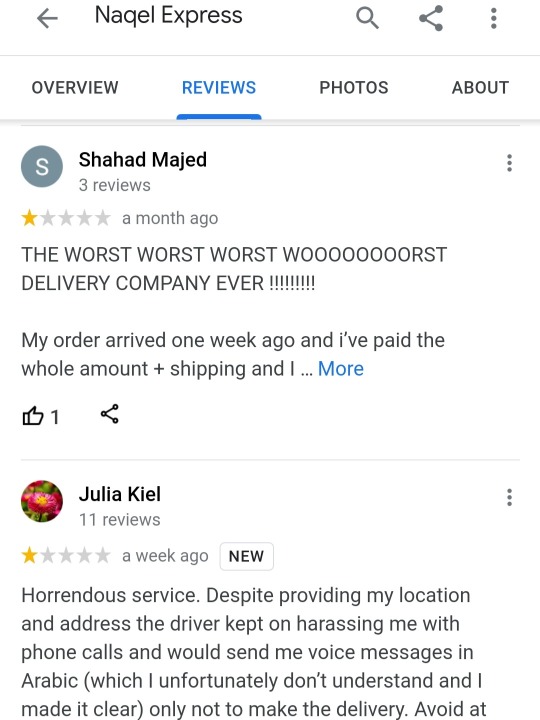
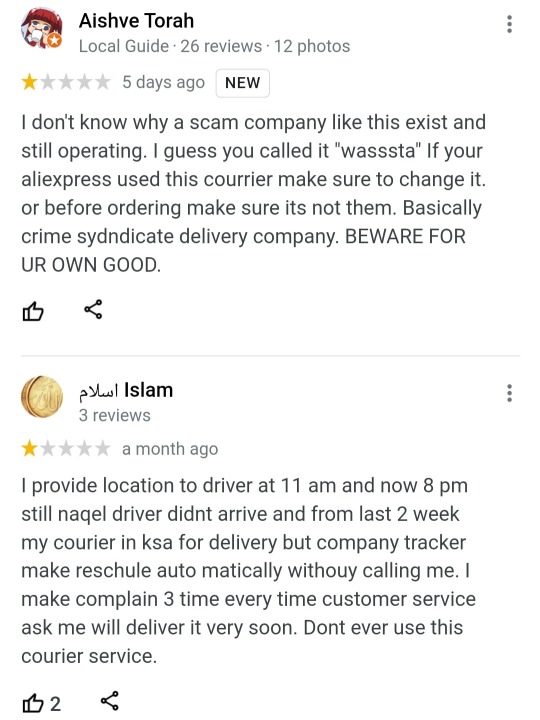
I did everything in my power to make it into their convenience, by embarrassingly messaging the carrier daily, they took a week of promising to deliver and flanking so my guardians reached a heated level of threatening, waving their hands nd almost tossing shi at mE saying that they don't care if they came and if i dared to order something again they'll do this and that. Not allowing me to open the door for the delivery guy when he comes, blaming me for missing vaccination dates (they kept missing them even before)& missing going to important places(again, they just didn't go to for ages), made them loose sleep, etc etc— in turn, I seen red and regretfully blew up.
I screamed at them its literally the only time I ever did this, it BECAUSE it easier on them & I'll do what I want whatever anyway, & to stop interrupting me while I try to explain things , then they suddnly back done and be like I'm not mad at u I'm mad at the delivery ppl, that they are proud of me for being able to do all this, and such sort. I left them to cool in my room, Idk how I did it but must have slam-gripped something so hard it chipped most of my short nails & cracked one, was glad I didn't hurt my drawing hand but yeah, goofy mani
They robbed me of the joy of anticipation & the dissipation of apathy, I started to lose sleep again and my liberating dreams left me and I don't think I remember leaving bed.
But still, If not force myself to do things.. there'll be nothing for me if I don't.. at least I know im able of that
I got my guardians happy tho after another tiresome refusal, by trying out one of those Uber-eat like local apps here, since they have no car and being disabled & ill, I ordered McDonald's for the first time. Slythry behind their backs per habit, told them someone coming and they had that look again, but thankfully the guy came through and didn't steal my money, heh. For a big 1800 calories meal I suppose it was passable, the happy fam faces I got was the real treat..


Oh with that thing with the credit card stating I owe them money, waited weeks & nobody got back to us? They started taking from my guardian's account directly to pay it, saying oh we did send you warnings--- TO THE SHADOWY LINES OF THEIR POSTERIOR A.K.A NOWHERE. Thankfully the account is mostly empty nd just for random transactions, i alerted my guardians not to use it. And again, my god, another round of endless calls and promises started, and we wait again so they just don't act as if we owe them a frking 17k dollars that we don't have.. was panicking cuz I have nothing and but my guardians were weirdly comforting about it and told me not to worry
One thing good bout no net is it made me stop thinking about life in general, and stop the tiny unnoticeable prick of misery when I have no input to share, trying not to helplessly compare people just living, in inflated style or not, in media, to my isolated-most-of-my-life style and missing much of that organic "life experiences and chances", heh. At least, my situation would be favorable to me if it was ever possible for it to let me have peace, or have the simple knowledge I'm not virtually imprisoned and have never familiarised with nothing of this world but the surrounding walls.. its nice to have more time to be consumed by muse and day dreaming that flutters life through my dull being and sing chorus of inspiring means for art to flow and finds its way delicately onto my realised canvas.. but no, I continued drawing whilst sight blurred with salty droplets contradicting that happy tintin dance on tiktok I worked so long on just cuz I couldn't stop, not the tears or the mad scribbles of determined intention to visualise the mourned excitement I need, hating everything I make

Somehow the lilac dream still intrudes, visualising me friends, living, in a quaint home, maybe we roommate, arm in arm we go to make every fracture of fate's encounters a disgusting adventurous thrill, like building a maze of cardboard or chasing each other in the dark.. maybe getting that half bleached head and endless ear pericings ... then it dies and I totally forget it..


But what those awesome headphones helped me do, literally blocks all their voices listening to Sev losing it and I can Waltz around not feeling gutted to go and interfere or play the referee each time. But I can't wear them forever, gives me a bad headache, and honestly; I can't be too neglectful.. my sibs hates me for it already hehe
At least these clothing came true to their measurements, felt the new sensations on how everything I wore hugs me & learnt the baffling ways on how "gender" and region plays different tunes on the same measurements. Getting fitting things felt like suddenly there's hope to be, for myself to be me, and ease this severe disassociation between who I am, and what my body is .. from how little I see myself nd consider it worthy of anything because of how long it been living like a phantom among people.. to numb this dysphoria until it be gone one day
Saddened that the only site I can't order from again if they keep using that awful carrier
...
I missed our country's 91 national day, too. They made sales everything 91 riyal so.. but knowing the sellers here, I don't think most of em went true with their offers.. Horrible news tho on the celebrations, sigh
I turned this into a dear diary, guess bothered you enough today, sorry
So thankful to yous, Idk if I can be back, but I'll remain creating, and will keep the thought alive of being tickled when sharing my creations with your viewing pleasure somehow
'till then my precious dears, take care 💛🙏
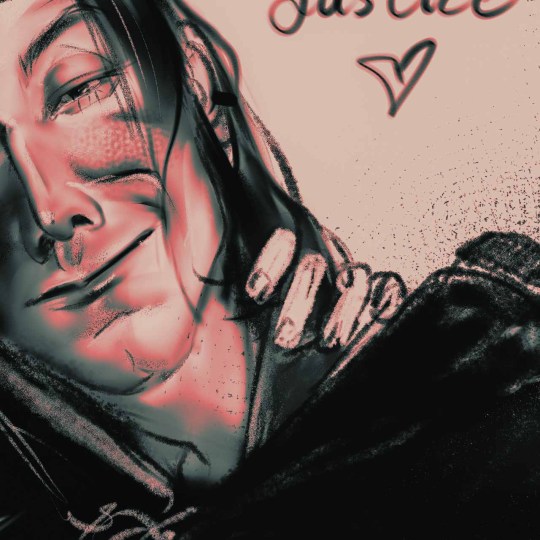

26.9.2021, 8 pm, sleeping
64 notes
·
View notes
Text
BoXiao : Endorsement CPNs
Just listing a few of my favorites, where we clowned so hard with what appears to be bxg biased signs from brands. Mostly 2020-2021. This was supposed to be a simple post but it got a little bit out of hand. So. Here you go. Enjoy!
Note: If you don’t like CPN posts, just scroll along. If you don’t like BJYX — this is not for you. don’t hurt yourself and skip this post.
1. RoseOnly - I will not add the RoseOnly x Peace Elite collaboration here anymore cause most of the people reading this should be familiar. A little bit of my thoughts on that are here.
Now let’s move on to other clownery, cause when I said we did see some 👀 before, I meant it.
• GG’s campaign with them where he showcased a bunny with rainbow colored flowers. They could be showcasing all the kind of flowers they have or LGBT friendly advertising. After all, All love is love. 🌈

• For Roseonly’s 8th anniversary, GG had a campaign and VCR w/ them and that big 8 flower. 8 means bo. It’s truly used for the anniversary but of course we CPN cause we are clowns.
https://www.youtube.com/watch?v=fwGnDR4zspI
• During Web’s promo for rules of my world and when his teaser photos came out— RoseOnly released a photo of a black rose ( same color as Web’s clothes in the teaser ) with the caption:
You’re the coolest guy in my heart.
• When they were doing a teaser for their new endorser, some people were pointing out that the silhouette looks like Bobo. lol. Twins!

• All the references to the Lonely Planet and Little Prince for this promotion. We all know that they both love LP and whether this is CPN or a personal preference— we’re claiming it!

• The green rose they once advertised with the caption I ONLY LOVE YOU. and with the green rose symbolizing innocence, simplicity and forever young. Green and those keywords, who do you remember?

• In 2019, they did a selling bundle with Shu Uemura which was a brand Web was endorsing at that time.
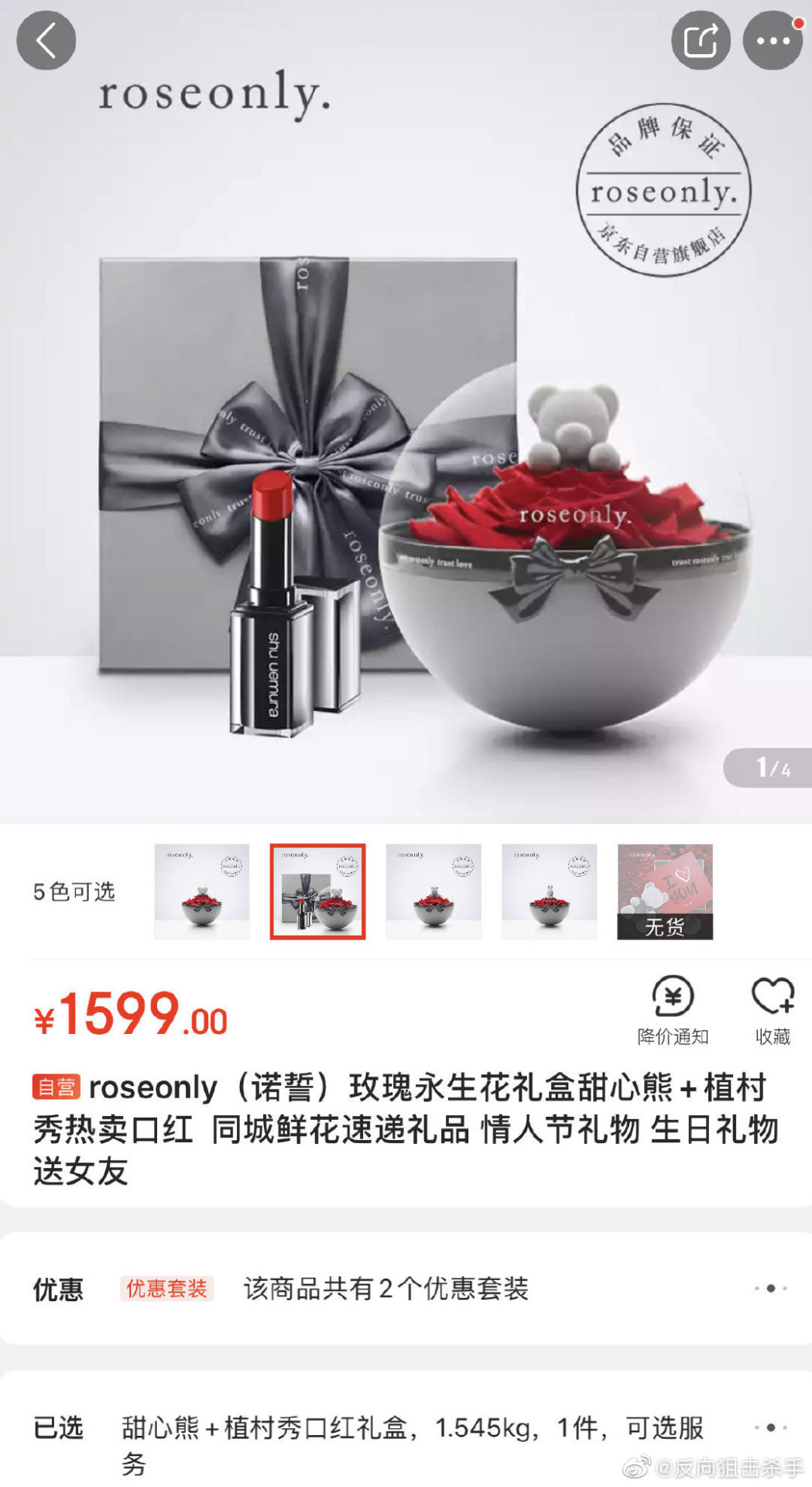
• In a live, the color green and red rose were together — GG and Web colors.

• An Ad in their online store where the display is the Leo rose which is Bobo’s zodiac sign. and GG is holding Libra. Leo x Libra. And with the caption below for their advertisement. We know Web is the Leo of all Leos but it’s still 👀
The proud Leo has a child-like arrogant temper. Some people think they are not easy to get along with, but they don’t know that they just have not entered their hearts. Actually, Leo’s tenderness is only for the right person.

Some other thing that I will add here for reference but I don’t necessarily believe. Link from weibo.
• When GG was announced as their brand spokesperson and Web gave a clue in his post. Also GG making 3 different posts and kadian combinations.
I’m adding in this collab they had with Eleme, the same time Web was endorsing the brand.
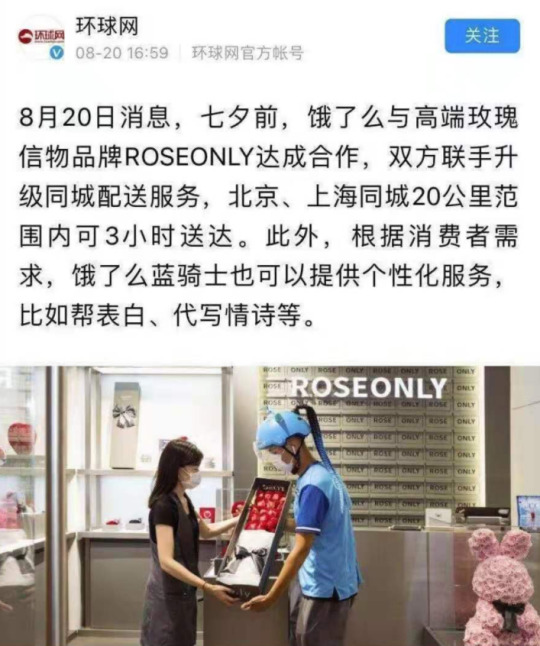
I’m sure I missed a couple more from RoseOnly but that just depends on how clear your BXG glasses are. To me the most important is their Lonely Planet / Star campaign with GG last year.
2. Shu Uemura - This is one of the OG brands that Web endorses and who loves him very much. They signed him when he was not yet a big star and flew him to different countries. They treat him very well. 🤍
• The most recent one is from their Ad with Bobo and a red ribbon which made us all think of WWX. I can understand from an Ad perspective that it’s perfect to pair up with a red lipstick — but our brains are wired to CPN. Soooo. And this is not their first offense with stuff like this.
• This Ad featuring Bobo : - "博"君一笑 BJYX.

• For the promotion photos of this eyeshadow palette, the colors and look is similar to GG’s painting for the Guangdian album cover. Yes. This was done some time after the song was released.
• This one is more of a coincidence. Years apart, both on the same day, they posted about a collaboration with One piece. It’s their favorite Anime. GG as Luffy & Web as Roronoa Zoro.

3. Qeelin - will be very lazy with this one and copy/paste from my jewelry post. Take note that this Bobo design is not new and had always been a classic from Qeelin.
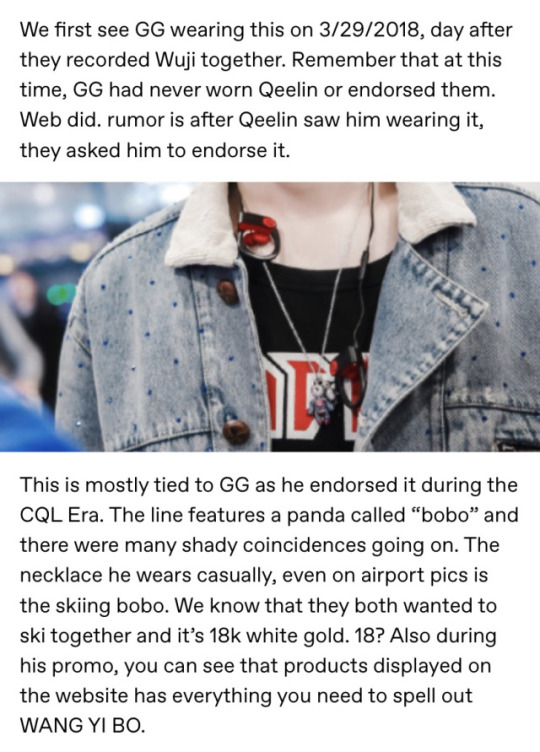



4. Kai Xiao Zao - Ah! KXZ! The brand that loves GG the most. So what signs did they give?
• Their recent new product is wontons. Who do we know that likes wontons? It reminded BXGs of the unofficial BTS when Web was nagging GG to eat Wontons.

• They used a well known BXG idiom:
"你是夏日限定, 也是来日方长"
5. Chunzhen - Endorsed by Bobo, and this is under Mengniu. It caused some drama— cause GG & Web are technically promoting the same company. but like, there are so many other c-ent artists endorsing this brand.
• They posted for this year’s Qixi, stating in the Caption that Bobo is able to balance love and work. Really? How did they know? And they had made a character called XIAO ZHEN for qixi ( a cartoon girl with blue hair ).
• Zhenguoli ( endorsed by GG ) and Chunzhen drinks which are under the same company posted graphics of the two drinks together. 👀

• Also since it’s both under the same umbrella company, and both yogurt drinks— you can see their boxes together in shops.

6. Stride - In Bobo’s box set initial release, 3 flavors were included and one of them is passionfruit or bai xiang guo ( bxg ). Of course, bxgs bought it because we were represented. ✌🏼
Also in a message, the brand acknowledged BXGs but later had to delete it because of well— you know who.

Dear Moto/Passion Fruit fans,
Thank you for your support to Hyunmai's spokesperson~. The gift box endorsed by Yibo is temporarily sold out, it is recommended You first collect and purchase, if it is sold later.
Please buy it as soon as possible~
7. Swarovski - endorsed by Web 🤍
• They had turtle charms and bracelets, which endeared them to BXGs.
• They had a bracelet where you can put charms and in their Ad, it spells YIBO. of course. However a BXG noticed that on their recommended letters to add next, the letters are XZ + heart with a dot.
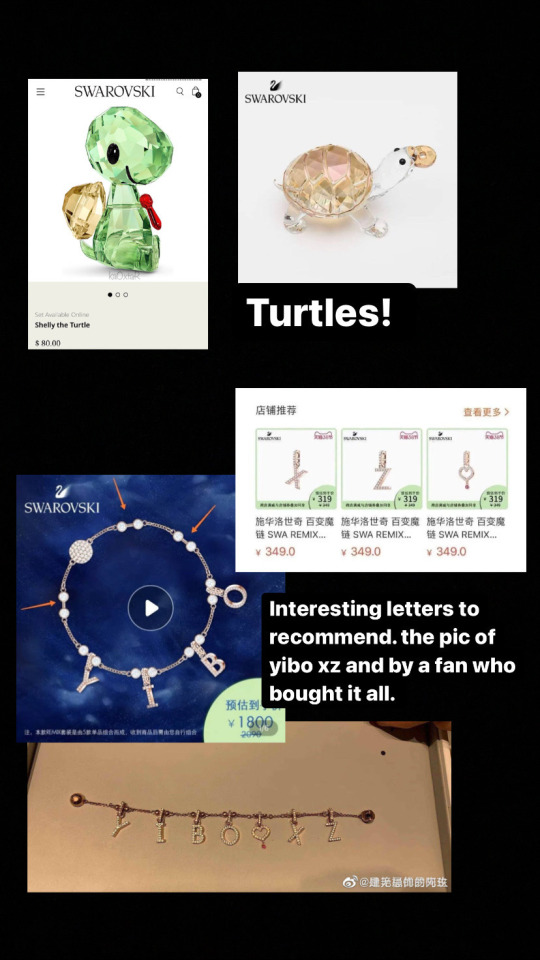
• Last year’s promotion of a lock necklace— Web changed his Weibo header. ‘Lock love, lock you.’

• His May 2020 Mother’s day promotion video that includes a confession (?). I know this is far off but the line used:
“ I love you, want you to see. I am Wang Yibo, this is my unique confession" is so similar to GG’s Bazaar confession.
youtube
8. Budweiser -- What we basically CPN about them is that they are an LGBT friendly brand and it’s always a plus when our boys endorse those kind of companies.
• Here you can find the CPN on the can that GG supposedly created with them.
• Their ad about ALL LOVE IS LOVE.•
An earlier Ad that had two male leads. and another one recently released with same sex couple. 🌈
Also they did a collab with G-shock which is a brand that Web endorses.

9. Man Han Feast Noodles
• The most recent one is GG playing the Guqin ala LWJ and looking out the window to see the moon ( again ala LWJ ). Best part is GG looking like he would burst out laughing and they kept in the Ad.
• In their Mother’s Day post one line says “if you love someone you’ll always encourage them to eat more”. Sounds like a familiar gesture right? Who do we know nags each other to eat?
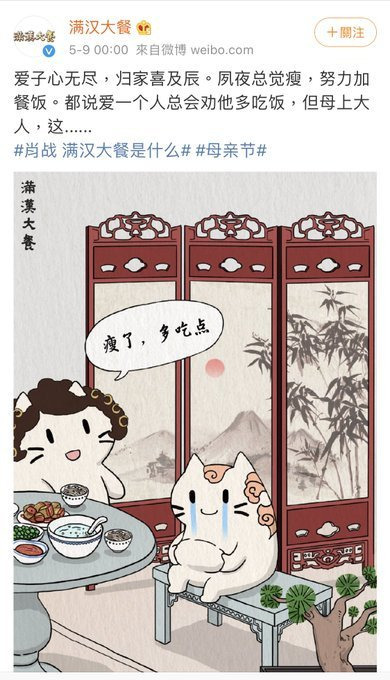
10. Zenith Do I even have to explain this?
• GG chose a rainbow watch from Zenith collection for Qixi Festival. 🌈

11. Mengniu - Oh well, just last week they had to clarify as an Ad from them was seen with the words: "并肩于雪山之巅" = BJYXSZD. (Side by Side at the snowy mountain top)

12. Anta/ Li-ning - I’m adding it here cause the store owners in this video brought out GG/Web standees together 😂 Context is, there was a BJYX gathering going on so they took that out cause they knew the attendees loved them.
Plus this shopping app that put them together.


I’m capping this post here and will update this sometime in the future. However the ones I added here stood out to me or I experienced when it came out. I wanted to add Luckin Tea / Lays / Olay but that will be for another time.
As with all the CPN, feel free to not believe any of these and just take it as a coincidence. Or people clowning and reading into things more than they should. lol. Whether these are intentional or not, BXGs are always there to support the boys whenever they can. 🙏🏼
115 notes
·
View notes
Text
Patent troll's IP more powerful than Apple's
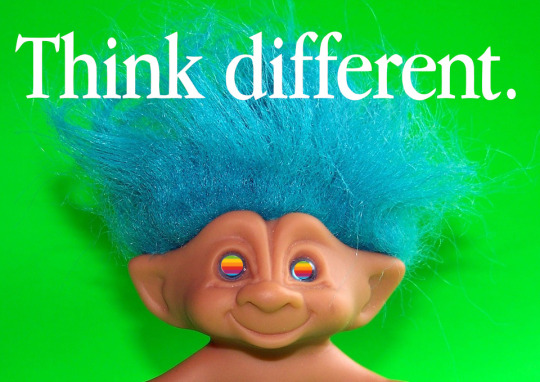
I was 12 years into my Locus Magazine column when I published the piece I'm most proud of, "IP," from September 2020. It came after an epiphany, one that has profoundly shaped the way I talk and think about the issues I campaign on.
https://locusmag.com/2020/09/cory-doctorow-ip/
That revelation was about the meaning of the term "IP," which had been the center of this tedious linguistic cold war for decades. People who advocate for free and open technology and culture hate the term "IP" because of its ideological loading and imprecision.
Ideology first: Before "IP" came into wide parlance - when lobbyists for multinational corporations convinced the UN to turn their World Intellectual Property Organization into a specialized agency, we used other terms like "author's monopolies" and "regulatory monopolies."
"Monopoly" is a pejorative. "Property" is sacred to our society. When a corporation seeks help defending its monopoly, it is a grubby corrupter. When it asks for help defending its property, it is enlisting the public to defend the state religion.
Free culture people know allowing "monopolies" to become "property" means losing the battle before it is even joined, but it is frankly unavoidable. How do you rephrase "IP lawyer" without conceding the property point? "Trademark-copyright-patent-and-related-rights lawyer?"
Thus the other half of the objection to "IP": its imprecision. Copyright is not anything like patent. Patent is not anything like trademark. Trade secrets are an entirely different thing again. Don't let's get started on sui generis and neighboring rights.
And this is where my revelation came: as it is used in business circles, "IP" has a specific, precise meaning. "IP" means, "Any law, policy or regulation that allows me to control the conduct of my competitors, critics and customers."
Copyright, patent and trademark all have limitations and exceptions designed to prevent this kind of control, but if you arrange them in overlapping layers around a product, each one covers the exceptions in the others.
Creators don't like having their copyrights called "author's monopolies." Monopolists get to set prices. All the copyright in the world doesn't let an author charge publishers more for their work. The creators have a point.
But when author's monopolies are acquired by corporate monopolists, something magical and terrible happens.
Remember: market-power monopolies are still (theoretically) illegal and when companies do things to maintain or expand their monopolies, they risk legal jeopardy.
But: The corporate monopolist who uses IP to expand their monopoly has no such risk. Monopolistic conduct in defense of IP enjoys wide antitrust forbearance. What's the point of issuing patents or allowing corporations to buy copyrights if you don't let them enforce them?
The IP/market-power monopoly represents a futuristic corporate alloy, a new metal never seen, impervious to democratic control.
Software is "IP" and so any device with software in it is like beskar, a rare metal that can be turned into the ultimate corporate armor.

No company exemplifies this better than Apple, a company that used limitations on IP to secure its market power, then annihilated those limits so that no one could take away its market power.
https://www.eff.org/deeplinks/2019/06/adversarial-interoperability-reviving-elegant-weapon-more-civilized-age-slay
In the early 2000s, Apple was in trouble. The convicted monopolist Microsoft ruled the business world, and if you were the sole Mac user in your office, you were screwed.
When a Windows user sent you a Word file, you could (usually) open it in the Mac version of Word, but then if you saved that file again, it often became forever cursed, unopenable by any version of Microsoft Office ever created or ever to be created.
This became a huge liability. Designers started keeping a Windows box next to their dual processor Power Macs, just to open Office docs. Or worse (for Apple), they switched to a PC and bought Windows versions of Adobe and Quark Xpress.
Steve Jobs didn't solve this problem by begging Bill Gates to task more engineers to Office for Mac. Instead, Jobs got Apple techs to reverse-engineer all of the MS Office file formats and release a rival office suite, Iwork, which could read and write MS Office files.
That was an Apple power move, one that turned MS's walled garden into an all-you-can-eat buffet of potential new Mac users. Apple rolled out the Switch ads, whose message was, "Every MS Office file used to be a reason *not* to use a Mac. Now it's a reason to switch *to* a Mac."
More-or-less simultaneously, though, Apple was inventing the hybrid market/IP monopoly tool that would make it the most valuable company in the world, in its design for the Ipod and the accompanying Itunes store.
It had a relatively new legal instrument to use for this purpose: 1998's Digital Millennium Copyright Act; specifically, Section 1201 of the DMCA, the "anti-circumvention" clause, which bans breaking DRM.
Under DMCA 1201, if a product has a copyrighted work (like an operating system) and it has an "access control" (like a password or a bootloader key), then bypassing the access control is against the law, even if no copyright infringement takes place.
That last part - "even if no copyright infringement takes place" - is the crux of DMCA 1201. The law was intended to support the practices of games console makers and DVD player manufacturers, who wanted to stop competitors from making otherwise legal devices.
With DVD players, that was about "region coding," the part of the DVD file format that specified which countries a DVD could be played back in. If you bought a DVD in London, you couldn't play it in Sydney or New York.
Now, it's not a copyright violation to buy a DVD and play it wherever you happen to be. As a matter of fact, buying a DVD and playing it is the *opposite* of a copyright infringement.
But it *was* a serious challenge to the entertainment cartel's business-model, which involved charging different prices and having different release dates for the same movie depending on where you were.
The same goes for games consoles: companies like Sega and Nintendo made a lot of money charging creators for the right to sell games that ran on the hardware they sold.
If I own a Sega Dreamcast, and you make a game for it, and I buy it and run it on my Sega, that's not a copyright infringement, even if Sega doesn't like it. But if you have to bypass an "access control" to get the game to play without Sega's blessing, it violates DMCA 1201.
What's more, DMCA 1201 has major penalties for "trafficking in circumvention devices" and information that could be used to build such a device, such as reports of exploitable flaws in the programming of a DRM system: $500k in fines and a 5 year sentence for a first offense.
Deregionalizing a DVD player or jailbreaking a Dreamcast didn't violate anyone's copyrights, but it still violated copyright law (!). It was pure IP, the right to control the conduct of critics (security researchers), customers and competitors.
In the words of Jay Freeman, it's "Felony contempt of business-model."
And that's where the Ipod came in. Steve Jobs's plan was to augment the one-time revenue from an Ipod with a recurrent revenue stream from the Itunes store.
He exploited the music industry's superstitious dread of piracy and naive belief in the efficacy of DRM to convince the record companies to only sell music with his DRM wrapper on it - a wrapper they themselves could not authorize listeners to remove.
Ever $0.99 Itunes purchase added $0.99 to the switching cost of giving up your Ipod for a rival device, or leaving Itunes and buying DRM music from a rival store. It was control over competitors and customers. It was IP.
If you had any doubt that the purpose of Ipod/Itunes DRM was to fight competitors, not piracy, then just cast your mind back to 2004, when Real Media "hacked" the Ipod so that it would play music locked with Real's DRM as well as Apple's.
http://www.internetnews.com/bus-news/article.php/3387871/Apple+RealNetworks+Hacked+iPod.htm
Apple used DMCA 1201 to shut Real down, not to stop copyright infringement, but to prevent Apple customers from buying music from record labels and playing them on their Ipods without paying Apple a commission and locking themselves to Apple's ecosystem, $0.99 at a time.
Pure IP. Now, imagine if Microsoft had been able to avail itself of DMCA 1201 when Iwork was developed - if, for example, its "information rights management" encryption had caught on, creating "access controls" for all Office docs.
There's a very strong chance that would have killed Apple off before it could complete its recovery. Jobs knew the power of interoperating without consent, and he knew the power of invoking the law to block interoperability. He practically invented modern IP.
Apple has since turned IP into a trillion-dollar valuation, largely off its mobile platform, the descendant of the Ipod. This mobile platform uses DRM - and thus DMCA 1201 - to ensure that you can only use apps that come from its app store.
Apple gets a cut of penny you spend buying an app, and every penny you spend within that app: 30% (now 15% for a minority of creators after bad publicity).
IP lets one of the least taxed corporations on Earth extract a 30% tax from everyone else.
https://locusmag.com/2021/03/cory-doctorow-free-markets/
Remember, it's not copyright infringement for me to write an app and you to buy it from me and play it on your Iphone without paying the 30% Apple tax.
That's the exact opposite of copyright infringement: buying a copyrighted work and enjoying it on a device you own.
But it's still an IP violation. It bypasses Apple's ability to control competitors and customers. It's felony contempt of business-model.
It shows that under IP, copyright can't be said to exist as an incentive to creativity - rather, it's a tool for maintaining monopolies.
Which brings me to today's news that Apple was successfully sued by a patent troll over its DRM. A company called Personalized Media Communications whose sole product is patent lawsuits trounced Apple in the notorious East Texas patent-troll court.
https://www.bloomberg.com/news/articles/2021-03-19/apple-told-to-pay-308-5-million-for-infringing-drm-patent
After software patents became widespread - thanks to the efforts of Apple and co - there was a bonanza of "inventors" filing garbage patents with the USPTO whose format was "Here's an incredibly obvious thing...*with a computer*." The Patent Office rubberstamped them by the million.
These patents became IP, a way to extract rent without having to make a product. "Investors" teamed up with "inventors" to buy these and impose a tax on businesses - patent licensing fees that drain money from people who make things and give it to people who buy things.
They found a court - the East Texas court in Marshall, TX - that was hospitable to patent trolls. They rented dusty PO boxes in Marshall and declared them to be their "headquarters" so that they could bring suits there.
Locals thrived - they got jobs as "administrators" (mail forwarders) for the thousands of "businesses" whose "head office" was in Marshall (when you don't make a product, your head office can be a PO box).
Productive companies facing hundreds of millions - billions! - in patent troll liability sought to curry favor with locals (who were also the jury pool) by "donating" things to Marshall, like the skating rink Samsung bought for the town.
https://hbswk.hbs.edu/item/why-south-korea-s-samsung-built-the-only-outdoor-skating-rink-in-texas
Patent, like copyright, is supposed to serve a public purpose. There are only two clauses in the US Constitution that come with explanations (the rest being "truths held to be self-evident"): the Second Amendment and the "Progress Clause" that creates patents and copyrights.
Famously, the Second Amendment says you can bear arms as part of a "well-regulated militia."
And the Progress Clause? It extends to Congress the power to create patents and copyrights "to promote the Progress of Science and useful Arts."
I'm with Apple in its ire over this judgment. Sending $308.5m to a "closely held" patent troll has nothing to do with the "Progress of Science and useful Arts."
But it has *everything* to do with IP.
If copyright law can let Apple criminalize - literally criminalize - you selling me If copyright law can let Apple criminalize - literally criminalize - you selling me your copyrighted work, then there's no reason to hate on patent trolls.
They're just doing what trolls do: blocking the bridge between someone engaged in useful work and the customers for that work, and extracting a toll. It's not even 30%.
There is especial and delicious irony in the fact that the patent in question is a DRM patent: a patent for the very same process that Apple uses to lock down its devices and prevent creators from selling to customers without paying the 30% Apple Tax.
But even without that, it's as good an example of what an IP marketplace looks like: one in which making things becomes a liability. After all, the more you make, the more chances there are for an IP owner to demand tax from you to take it to market.
The only truly perfect IP is the naked IP of a patent troll, the bare right to sue, a weapon made from pure abstract legal energy, untethered from any object, product or service that might be vulnerable to another IP owner's weapons.
A coda: you may recall that Apple doesn't use DRM on its music anymore: you can play Itunes music on any device. That wasn't a decision Apple took voluntarily: it was forced into it by a competitor: Amazon, an unlikely champion of user rights.
In 2007, the record labels had figured out that Apple had lured them into a trap, selling millions of dollars worth of music that locked both listeners and labels into the Itunes ecosystem.
In a desperate bid for freedom, they agreed to help Amazon launch its MP3 store - all the same music, at the same prices...without DRM. Playable on an Ipod, but also on any other device.
Prior to the Amazon MP3 store, the market was all DRM: you could either buy Apple's DRM music and play it on your Ipod, or you could buy other DRM music and play it on a less successful device.
The Amazon MP3 store (whose motto was "DRM: Don't Restrict Me") changed that to "Buy Apple DRM music and play it on your Ipod, or buy Amazon music and play it anywhere." That was the end of Apple music DRM.
So why hasn't anyone done this for the apps that Apple extracts the 30% tax on? IP. If you made a phone that could play Ios apps, Apple would sue you:
https://gizmodo.com/judge-tosses-apple-lawsuit-against-iphone-emulator-in-b-1845967318
And if you made a device that let you load non-App Store apps on an Iphone, Apple would also sue you.
Apple understands IP. It learned the lesson of the Amazon MP3 store, and it is committed to building a world where every creator pays a tax to reach every Apple customer.
116 notes
·
View notes
Text
Fine Line

>>>Catch up with the Fine Line Masterlist!<<<
word count: 2.5k
story summary: You and Harry had always walked that fine line of friends or something more. Singlemom!Reader x Harry Styles
warnings: Language // Arguments // Intimidation?
a/n: Let me know what you think. I love feed back. Especially since I’ve been stuck in a writing rut and this seems to be the only story I can focus on lately.
>>><<<
The second those two pink lines showed up on that plastic test your whole life changed. Your whole mindset changed. A swirl of anxiety and excitement whirled around in your stomach that now housed your child.
Your child.
You squealed as you looked at the pregnancy test. No, you and your boyfriend of 3 years definitely weren’t trying to get pregnant but this was one of the best accidents that you'd ever had.
Your heartbeat fast in your chest as you laid the test on the bathroom counter. Tears leaking out of the corner of your eyes as you looked lovingly at those two bright pink lines.
You pulled out your phone, snapping a picture of the test, and sending it to two of your oldest long distance best friends. This was too much information to process on your own and you definitely needed some ideas on how you were going to tell your boyfriend.
You hadn't even had time to put your phone down when it started ringing in your hand. The vibration startled you out of your thoughts.
"Hey." You said with a big smile across your face. Grinning from ear to ear, so excited to talk about your big news.
"Don't hey me like that! Oh my god, I'm so excited!" One of your best friends, Abby, said from the other line, her voice higher than usual.
"I know me too. It was totally unplanned though. I'm not sure how he'll react." You said with a sigh, your eyes never leaving the test for long. Constantly checking back to make sure none of the lines had disappeared.
"He'll be excited or I'll punch him in the dick." She mumbled under her breath making you laugh as you took the test and hid it in a drawer in the bathroom.
"We've never talked about it before." You chewed anxiously on the inside of your cheek. Your already upset stomach growing weaker by the second.
How had you never talked about this before with him? Why haven't you?
Those pesky thoughts of him turning up his nose at children during family gatherings looming in your mind. Would he be like that with his own child?
"I'll be your baby daddy." She said, cutting off your thoughts.
"Shut up." You said with a laugh as you leaned against the countertop. Not entirely sure if you were going to barf or not with how much you'd managed to work yourself up.
"Are you at work?" You asked when you heard phones ringing in the background.
"Duh."
"You could have texted." You said sternly.
She had never taken her secretary's job seriously and you didn't blame her. It wasn’t at all what she had originally planned to do but things change when schooling costs as much as it does.
"This is not a texting moment! Besides, this place doesn't pay me enough anyway."
"Probably because you're on your phone during company time." You said, choosing to ignore her annoyed tone of voice as you made your way out of your bathroom and into the living room. Plopping down on the couch, your hand instinctively going to your flat stomach.
"How're you going to tell him?" She asked, changing the topic from you telling her off.
"Dunno. I might tell him after dinner, like make his favorite meal or something and tell him afterward."
You honestly had no idea how to tell someone they were going to be a dad. Sure, you saw those videos of people surprising their husbands with gifts and videotaping it for all of Instagram to see but that seemed so impersonal to you.
Plus, you had no idea how the hell he'd handle something like this. Would he cry? Would he leave you?
You honestly had no idea. The only sort of children interaction you two had together was the times your baby cousins showed up for your family's Christmas party and he didn’t go anywhere near them.
"Ohhh, romantic." She said you hummed your agreement as you closed your eyes. Your head was pounding with yet another headache which you now knew was because of all the hormones your body was producing.
"Maybe I could buy an onesie or something. I don't know… I'm nervous." You said, with your arm going over your eyes. You needed a nap, desperately.
"Don't be, girl. He loves you."
"Yeah, I know, just anxious. You know how guys are."
That nervous tick of yours coming through as you took your hand off your eyes to bit your nails. The state of them was gruesome.
"Don't be anxious. You've been together since college. You live together. I mean, you guys are like the dream team."
"Thanks, Abs." You sighed, pulling your hand away from your mouth and back over your eyes.
"No problem, let me know how tonight goes, okay?" She said, sensing the conversation was over as your voice grew more and more tired.
"Alright. Love you." You said with a slight smile on your face, knowing whatever happened you at least had great friends who would always have your back.
"Love you too babies and so does Jesse just remember that."
>>>
After your much-needed nap, you spent the rest of the day cleaning your apartment. Every speck of dust removed from every surface of the home you two had made together over the years.
Every picture of you two traveling to different countries wiped down. Every pillow you bought while visiting his family out of state fluffed. Every piece of furniture you two decided on together was polished.
You even managed to cook his favorite meal that his mother gave you the recipe for the last time you had been to see her at the retirement home she now lived in.
Everything was perfect.
The smell of the roast beef dinner wafted through the air in the apartment as you sat the dish on the dining room table. The tall and slender white candles burned bright in their holders. The soft warm glow from the flames dancing across the room as you sat in your chair smoothing down the dress you pulled out of the back of your closet.
It was 5:49 and the love of your life should be home any minute.
You nervously fidgeted with your hands, fumbling with your hair, tugging your dress as the minutes ticked away. Your heart picking up its pace the closer it got to 6. The sound of the door opening had you jumping out of the chair, startled but trying your best to keep a calm exterior as you turned to smile at Jesse.
His eyebrows furrowed tightly together as he took in the sight around him. His favorite dinner on the table, you dressed in one of his favorite dresses that you hadn't worn in forever. That bright smile on your face as you sauntered over to him.
"Wow, you look amazing." He said, leaning down to kiss you, his bag and coat was haphazardly thrown to the ground as he wrapped his arms around you. A smile on both your lips as he pulled you close to him.
"Didn't miss any important days, right?" He asked when you pulled back from the kiss, your fingers brushing his soft brown hair out of his eyes.
"Nope. Just wanted to surprise you with something nice." You lied smoothly, hoping he didn't notice your eyes darting away from his.
"It's perfect, baby. Thank you." He said before kissing your forehead.
You had to constantly remind yourself to not start crying from him being so sweet as you took his hand and led him to the table. He quickly walked in front of you to pull out a chair for you.
"Feel like it's my birthday or something." He said as he settled into his own chair. Eagerly dipping out a plate for both of you.
"Well, you work hard. It's nice to come home to this every once in a while." You shrugged as you picked up your fork to eat the meal your stomach and baby definitely weren’t in the mood for.
"Thank you, I know you haven't been feeling good lately, means a lot." He said with a smile as he leaned across the table to give you a chaste kiss.
"I wanted to talk to you about that actually." You said after you swallowed down the food that seemed to be stuck in your throat. Quickly downing a glass of water when he hummed out for you to continue, his mouth full of your delicious dinner.
"I'm pregnant." You said excitedly a smile on your face that quickly fell when you saw his wide blue eyes. His fork clattering against the nice China plate.
"You're joking." An incredulous look on his face as he eyed you down across the table that had suddenly started to feel more like an interrogation table.
"What? No. I'm not joking."
"You've got to be kidding." He said his voice rising as his hand brushed through his hair. Letting out a sigh as he crossed his arms to look down at you.
"No, Jess. I'm not kidding. I'm pregnant." You said yet again. His face contorting from confusion to anger, lips pursing as his eyes flashed in a way you'd never seen before.
"This is a mistake! You can't be, we use protection!" He roared from the other side of the table. His hand slamming down on the glass top so hard all the dishes clattered and clanked against each other.
"Birth control doesn't always work." You instinctively grabbed your stomach as you backed away slightly in your chair. Tears in your eyes as you looked at the guy you loved ripping your heart into pieces.
"Bullshit. You must have missed a dose or stopped on purpose!"
"I didn't stop it or miss any doses. What's wrong with you?" You asked, your voice rising as all your hopes and dreams of this night and your future together started to crumble down around you.
"I don't want a fucking child, Y/N! That's what's fucking wrong with me." He yelled as he flipped his dinner plate on the floor. Food flying across your perfectly cleaned floors and walls.
"Well, it's too late for that!" You yelled back as you stood up from your spot at the table. Tears flowing freely down your cheeks as you turned to leave the room.
Hoping time to cool down would do him some good. Help him get his head on straight. Realize this is his child.
"Abort it." He called out making you stop in your tracks.
"What?" You asked, giving him one more chance to take what he had just said back, wishing by him taking it back that he didn't mean it.
"You heard me. Abort it. I don't want it." He scoffed in an irritated tone and suddenly, like a light switch flipping, the man you cared for and wanted to spend your whole life with looked more like a monster than he did a man.
"I'm not aborting our fucking child!" You yelled at him. Your body shaking as you cried the hardest you've ever cried in your life.
"I'm not raising a kid. Either abort it or leave." He said with his head pressed firmly in his hands.
Your mind already made up as you headed for your bedroom.
"Where are you going?" He asked, following behind you as you tore a bag out of your closet and hastily threw random items of clothing in it.
"Y/N?" He asked again when you pushed by him, storming out of the bedroom and towards the front door.
"Y/N, fucking stop! What are you doing?" He yelled this time, his voice vibrating along the walls in the house you used to call home as you slipped on your shoes.
"You gave me an ultimatum." You said as you dried your eyes and opened the door. "I've made my choice."
"My things will be out by the end of next week." You said as you stared out the door towards your car. Forcing yourself to walk straight out the door, slamming it behind you.
Your heart broke into a million pieces as you drove to the only other place in the world you wanted to be. Realizing within seconds that Jesse wasn't going to come after you. He didn't call out for you, didn't follow you out the door, didn't even bother to text or call as you drove the 15 minute trip to where you were going.
Your eyes filled with tears as you stood on the doorstep with your bag around your shoulder. The tall door in front of you looming over you as you stared at. You couldn't even bring yourself to knock as you sobbed into your hands, crumbling into a ball onto the steps.
"Y/N?" The sound of your name snapped you out of your breakdown. Your head turned to see one of your oldest friends in the doorway of his house.
"Hi, Harry." You said through your tears, your hand wiping away the rivers that flowed on your cheeks as you looked up at him.
"What're doin' 'ere? Where's Jess?" He asked, stepping forward towards you, his hands wiping away the sleep from his eyes.
"I- um…" You stuttered, your eyes darting away from his. "I need a place to stay for a few days and you always said I'd have a place here."
"Course y'do. Told y'when we were 8 that I'd always have a room fo' yeh." A hint of a smile on his face that slid off the second you didn't respond.
He sighed sitting down beside you. His shoulder pressed tightly against yours as you both looked out towards the street. The city lights twinkling like stars.
"Wot happened?" He finally broke the silence between you two. Your head laying on his shoulder as you took a deep breath in, trying to remind yourself to be calm.
"I'm pregnant and he told me to abort it or leave." You said, Harry's arm wrapping around your shoulder instantly, pulling you into some sort of weird sideways hug that was tight enough to almost hurt but was the kind of hug you needed. Silent tears falling from your eyes onto his white shirt as his head rested on the top of your hair.
"So, I left." You sighed. Your body sagging as Harry tensed up behind you but you were too exhausted from the day, exhausted from the hormones, exhausted from the crying to even notice.
"Okay, let's get y'inside, yeah?" He asked you nodded your agreement as he helped you inside.
"Can you call Gem and Abs? Let them know I'm okay? They're blowing up my phone." You said once you were inside the house. Your long-forgotten bag placed by the front door as Harry locked it again.
"Yeah, I'll call 'em." He said as he took your hand pulling you to the guest room.
"Thanks, Hazza." You mumbled as you turned to face him. Your arms around him as you nuzzled into his chest.
"Always 'ere fo' yeh, Y/N/N."
#Harry Styles#Harry#Harry Styles x Reader#Harry Styles x You#Harry Styles x Y/N#Harry Styles Fanfiction#Harry Styles Fanfic#fanfic#Fanfiction#writing#mine#FL
249 notes
·
View notes
Note
In mediveal times how long did a noble family have to exist for to be considered noble and not new money? 10 year, 50 years (son/grandson), 100 years (great, or great-great-grandson), or something so big like 200 years?
I'm going to be bluntly honest.
I have no frikkin' idea.
But we can think it through logically, at least a little bit, as well as draw parallels to modern or recent-era situations that are similar.
(This post ended up rather long, so I’m inserting a Keep Reading cut for the rest of y’all...)
We have a lot more writings on the Georgian/Regency eras (1700s onward) regarding the newly rich versus old money...but that's because there were more opportunities to garner new wealth, through the exploitation and colonization of explorers in the Americas, merchants traveling overseas over much longer distances due to better ship design and navigational charts, etc.
We have complaints about sea captains buying noble titles, giving money to their sovereigns who, for whatever reason, needed more income than they garnered from taxes, etc. People who were ennobled for enslaving foreign regions and extracting local resources for European consumption, so on and so forth.
Part of that was because prior to the boom in exploitative exploration & colonization, there was literally only so much land that could be parceled out to heirs or sold to the newly wealthy merchant classes, and land was still seen as the biggest economic stimulus point (the constant need for herds and crops to feed everyone, etc).
Even mining operations and foundries for smelting iron, etc, were still not advanced enough to be productive enough, because science and technology weren't far enough along for these things to provide enough metal to spark the Industrial Revolution until the turn of the 1800s and later.
We can conclude that the means to amass a lot of wealth was, therefore, difficult to acquire prior to colonization and industrialization. This was not to say that it didn't happen! There were always wars against one's neighbors, there was cross-country trade that could make one rich, someone could stumble across a gold mine (literally, a source of precious metals), so on and so forth. The Crusades were initially about Christian religious fervor...and the acquisition of the wealth of their supposed enemies, the Muslims (who weren't enemies to begin with, btw).
People in the Middle East were literally sitting at a crossroads of trade between Europe, Africa, and Asia, so yes, they had access to a lot more cross-continental commerce than anywhere else. And when the invading crusaders brought back some of that wealth--spices, silks, exotic jewels, dyes, decorative objects, and ideas (yes, those can be a source of wealth! Cross-pollination between different groups sharing ideas almost always leads to new innovations!)--it sparked avarice in the hearts of a lot of people who saw a potential opportunity for acquiring more wealth.
Those who came back with that wealth...possibly bribed their sovereigns, bought lands, became the newly rich...except back then there wasn't quite the same class divide barrier to break. Because those who could afford to go to the Holy Land to conquer & rob it of its wealth had to be able to not only walk themselves there, with enough funds to provision themselves along the way, but needed the equipment to be able to successfully capture rich targets. Horses, armor, weapons, so on and so forth.
They'd also have to attach themselves to some noble's entourage if they weren't noble themselves, and that meant they'd have to share their plunder, etc...or be counted a brigand at best. (Let's be blunt, the difference between sanctioned plundering and brigandry is having the approval of a big group of people regarding your actions.) This meant that most of those that made their wealth off of the Crusades often did so as second and third and fifthborn sons, who weren't going to inherit much anyway--or bastard sons, who by law couldn't inherit without their family jumping through legal and liturgical hoops.
The ones who profited the most off of these plunder campaigns were therefore most likely already a part of the ruling class--or at least the mounted warrior class, which was seen as close enough to being the same thing. Compared to the long-distance merchant classes, who rode or sailed long distances to trade items only produced locally (and thus rare elsewhere) for exotic ones they could bring back and trade at home, the bastards and fourth-born sons had an easier time getting to be acknowledged as "acceptable new money."
Most merchants who did get wealthy tended to do so in free cities, or in city-states that were already mostly democratic (albeit the kind confined to wealthy male citizens) in nature, such as Venice and Genoa, where they did not have kings, or did not have a strong kingly or nobility presence (unlike Paris or London, etc, which were the seats of monarchial power).
But there is one more factor to consider: The Black Death.
Prior to the first major sweep of bubonic plague through Europe in the 1340s, the vast majority of European medieval life was pastorally centered, with the vast majority of people being serfs legally obligated to work the farms for the local lords, a few freemen, the clergy (who were slowly focusing on attaining lots of wealth themselves), and the nobles who were supposed to watch over and protect everyone from outside marauders, etc (to various degrees of belief & efficacy; some were genuinely good leaders who wanted to protect and share the wealth, while others were exploitative SOBs, and most were at some stage in between those two extremes).
When a quarter to a third of everyone died, however...that left crops rotting in the fields, people were weakened and devastated, whole reams of knowledge were lost with the deaths of those who were the masters of their crafts, and...well, the wealthy staggered under the weight. IF they survived themselves, of course.
The vast shift in the availability of workers meant the surviving workers started demanding many of the freedoms they had been previously denied--they literally took their possessions and left their serf-bound homes to go work for anyone who was willing to pay them a lot more and give them more legal freedoms. (Modern folks really need to take notes!) And because all ranks and stations were being hit more or less just as hard as any other caste level, that meant those who could have enforced the peasants staying on their lord's demense-lands were unable to bring enough of them into play to herd the wayward serfs back to their quasi-slavery.
After all, if you had 100 warriors, 50 of which were needed to keep a watch out for brigands and guard the castle, you could afford to send out 20-30 of them to spread out, search for, and round up a stray serf who had run away, while keeping the remainder in reserve. (Remember, serfs who ran away to free cities and stayed there successfully for a year-and-a-day were considered free men and could not be dragged back to their farms...but that left 366 days in which they could be caught and dragged back.)
But if you lost 30 of your warrior-class, you'd still need 50 to guard the castle and its lands--possibly more in such restless times!--and you'd only have 20 to spare, period. Which meant in a practical sense that you'd only have 5-10 at most you could send out (needing to keep a reserve at your home base), which meant searches for runaways were far less efficient--either they'd have to search fewer areas with large enough groups to capture and return, or they'd have to split up, find the serf, run for help, and hope the serf was still in that same area when they got back with enough forces to capture the serf without risking injury to themselves or to the peasant in question.
Prior to the Black Death, upward mobility was a rare thing--you practically had to save the life of the king in battle, etc. This was of course easier to do in the 700s than in the 1200s, but still not an easy thing. And even then, you'd have to prove you were "noble enough" to be accepted by the upper classes. We know this upward mobility of the wealthy-but-not-noble was restricted because we do have increasingly stiff sumptuary laws--aka what non-nobles were allowed to wear.
Literally, wearing winter ermine--the white fur of the ermine mustelid with the black-tip tails--was reserved for royalty and very high ranked clergy and sometimes very high ranked nobility depending on timeperiod and culture. Indeed, a lot of furs became increasingly social-rank-dependent, to the point that only squirrel fur was considered "open for everyone." Yes, only squirrels, because even rabbits were considered to "belong" to the local lord, and poaching them for eating, never mind for wearing, became a punishable crime.
You had to have permission from your social betters to wear luxurious furs and other items....so we can conclude that upward mobility was not much of a thing...up until the devastation of the Black Death upended social order, and the vast majority of people seized back many of their natural rights and forced social status mobility upon those who held all the wealth and the power. (*ahem* Do Take Notes, People. *stares in Covid Pandemic* (Yes, I have no chill on this point, there are TOO MANY PARALLELS to what we're suffering today, socio-economically.))
Anyway! if you're thinking medieval pre-pandemic, there wasn't as much social mobility. Post-pandemic (and there were several waves of the Black Death and other plagues, btw, including a devastaing plague in 1655, not just the most famous one of the late 1340s/early 1350s), there was a lot more elbow room for jostling your way toward the top.
However, the best hope one could have for social mobility was to buy into a noble family. Usually via a marriage contract, wherein the non-noble brought in a great deal of wealth to a potentially impoverished noble family, with their offspring to be considered part of the noble family.
This was often done by someone with an ongoing source of wealth, such as merchant enterprises, or someone who could, say, create exceptional glassware, or whose family line held trade secrets in a lucrative profession, such as the thread-of-gold makers in London, ladies who were taught the secrets from an early age and whose skills were sought far and wide--or the lacemakers of certain regions in France, the Low Countries, southern England... Though to say it was "often" done isn't exactly an indication that it was done often, just that it was more likely a means to acquiring social status than saving the life of a king, etc.
So those are several of the possible ways to become wealthy and high in social status. As for "new rich vs old money"...that's a complex and lesser known subject. Most of the records we have from the medieval era were from legal documents and/or household ledgers, neither of which lend themselves to including personal annotations on things like, "A suckling pig and 2 pounds 16 shillings - Mercantile Atteborough paid this much to be included as an honored guest at the Feast of St. Barnabas in my southern manor keep."
Or maybe, "Goodwife Ashton paid 20 shillings to be able to wear a mantle lined with sable marten fur throughout the winter despite it being above her station, the rude hen" or "My son decided to give a length of silk to the village baker's daughter, even though I told him that she had no right to wear such things until after they were wed and elevated into the family fold..."
We do have a few sources mentioning such things from earlier eras, but writing was such a laborious process, the materials so costly (parchment is literally the inner shaved skin of an animal, often a goat or a sheep, and nowhere near as cheap as paper to produce...but paper breaks down so much faster than parchment over time), that most people tended to not meander about various subjects, but instead saved writing for "truly important" subjects--keeping monetary accounts, tallying things for tax-time, writing about God, and for those few scholars who had the wealth and support system, writing about the natural world, the dawning of science and reason, so on and so forth.
So we don't know how much these things were considered, only that they were considered to at least some small extent.
With all that said, we do know that the longer a family bloodline remains in power, the more determined they are to keep that power, which means concentrating it in the upper classes. (This is dangerous biologically, as inbreeding is...um...yeah. BAD.) In later years, those being allowed to join by marriage would be under heavy expectations to fit in, obey the head of the household/bloodline, and copy the manners and traditions of the class they were joining. But again, not many records of this.
Not all marriages were made for love. We see love as a marital concept among the higher classes only being developed after the rules of Courtly Love had been established for long enough that love as a possibility for high-ranked persons was considered possible. Prior to that, it had been as much or more a business transaction to increase familial power and wealth. But while for the common peasant a marriage was often made based on love and/or compatibility/mutual respect, there were still plenty of families in the in-between ranks who insisted on deliberately matchmaking or at least vetting "prospects" by how much wealth or social power each party or family held.
Again, we don't know how much the consideration of depth of a family's noble or wealthy lineage played into these calculations in the Middle Ages. We do know from the post-colonial era that many noble families back in Europe were scandalized by colonists & other overseas exploiters making loads of money and then not only trying to buy themselves a noble title, but in trying to act like they were the social equals ot the nobility.
"American heiresses" (or anyone from any overseas colony) would come to places like London to enjoy "high civilization." When they did so, their wealth would attract prospective grooms, but their breeding (aka, lack of it) would almost invariably scandalize the prospective groom's social peers and/or family members...until the Industrial Revolution created so many rich "commoners" that the nobles actually lost most of their social status power.
This nobility clout faded especially when America came to economic and cultural prominence on the world stage--a land that prided itself on having zero nobles...but that was not to say America didn't (and doesn't) have a ruling class. We just use different names, and we still have our own Old Money groups, who hoard the reigns of power for themselves and their heirs. Rockefeller is a family name known throughout the nation, as is any politician named Kennedy, for example--and now we have names like Gates and Bezos and Musk...though Gates is technically more old-money than the latter two. (Slightly.)
Unfortunately for the Old Money groups, it is now far too easy for "upstarts" to make billions, diminishing the Old Family names...but make no mistake: Most of these new billionaires still come from money, because they've leveraged their older family ties and associations to wedge themselves into these positions of visible economic power. (Musk bought himself into Tesla; he didn't actually found it. Gates, on the other hand, actually did found MicroSoft and did a lot of the actual programming work in his early days.)
...With all of that said, we only need to look at one more item to determine how long it would take Newly Rich to become Old Money: Time. Depending upon the region and the era...? About 3-4 generations would be my best guess.
Life was short and hard for many people in the Middle Ages, due to the lack of advanced healthcare, with a lot of people dying fairly early on from infections, illnesses, injuries, and the like. While the upper classes would have a lot more access to good food and be less likely to suffer from famines, giving them a better chance at a longer life due to having their nutritional needs met and their bodyfat being a little higher (it's a cushion against ilnesses and injuries, folks; stop being fatphobic!), they would still suffer, and often die much younger than a typical modern-day person might, even one living in modern-day poverty. (Wear your goddamn masks, people!! *ahem*)
When you live in a world where getting to live to be a grandparent or even a great-grandparent is a solid accomplishment, changes will be accepted much more quickly by each successive generation. Mostly because "that's the way it's always been" will have a shorter timeframe needed, due to the lack of grandparents raging on and on about "...that old upstart Timothy bought himself land and the funs to put up a keep on it! He's no more a lord than George the Goose Boy!"
The longer something goes unchallenged in the day-to-day lives of the people experiencing it, the more it seems like it should exist that way. (*STARES HARD AT THE LAST 40 YEARS OF ECONOMIC SUPPRESSIONS.*) And by that metric, given the average shorter lifespans even if you don't count early childhood deaths in mortality statistics across the broad span of medieval times in Europe...it wouldn't take more than 60 or so years for everyone locally to accept that New Money is now Old Money.
...Or that acceptance could happen even faster, if the New Money is clever enough to "share the wealthy" by investing their time, money, and effort in building good relations with their wealthy/high-class "neighbors." This would include publicly deferring to "their betters" and copying the social mannerisms of the upper class without mockery and without overstepping the bounds of what they could reasonably be allowed to do with their newfound status. Truly savy social climbers would be cautious and smart about flaunting their new power, planning for the long term haul rather than reveling too much in the moment.
Note that this statement is building good relations, not spending absurd amounts of money on lavish parties, ostentatious clothing, etc...which brings us to the Old Money side of the equation. Again, this is based in my observations on various peripheral socio-economic factors, and not on direct evidence.
The one thing that would irk the Old Money types pretty much every single time is newcomers being overly flamboyant with their wealth. Especially since the flamboyantly wealthy often end up the stupidly impoverished within a short span of time--to be accepted, the newly rich would have to understand the balance between claiming their wealth and status, and investing it to maintain that power. Wasting it wouldn't be viewed well by those who were raised generation after generation with lessons of how to maintain, expand, and increase their family's wealth and power.
It would be far better for a rising family to absorb and adopt higher-ranking privileges slowly and steadily, rather than greedily grabbing at all of it, all at once. And if they reach out to a neighboring Old Money family "for advice" and show some humility, moderate amounts of flattery (again, not in excess), asking to be treated like a nephew or niece in need of a mentorship, the Old Money family might actually take a proprietary interest in this upcoming family, giving them lessons, helping them get better access to things that were reserved for the upper classes.
Flattery is only good in the long term if there is some genuine sincerety behind it (or the one you are flattering is a narcissist, but they rarely hold onto power for long without serious help from outsiders). Instruction can be obtained with flattery, but also by in being respectfully attentive. And making sure you're not a rival to the Old Money neighbors around you can go a long way toward gaining their acceptance, too. By handling one's rise to power with these things in mind, it could actually allow the Newly Rich to be accepted that much faster, to within a matter of years or decades (with a great deal of luck), if not by one or two generations sooner than usual.
As mentioned above, sometimes Old Money doesn't actually still have the wealth that everyone assumes they have, and they need to accept New Money into their family--aka via an economically advantageous marriage. Sometimes they do have that money, but the sources of reliable wealth and political power are shifting, and the Old Family wishes to diversify its portfolio (so to speak). And sometimes they just want to diversify their power structure. This can include gaining access to up-and-coming industries, being able to have a say in how and where they're used (iron smelting, for example).
Just be aware of the fact that most of the time, if anyone accepted Newly Rich into their Old Money family, it was often an established male accepting a rich but socially-lesser female--aka the "American heiress" syndrome mentioned earlier. While the heiress wives would be...tolerated...if they toed the line, only their children would be considered "much more socially acceptable" because it would be presumed their fathers were raising the children in the Old Money Ways.
(Keep in mind that this is a worldwide trait for patriarchal cultures, not just European in nature. For far too many years, India's caste system allowed women from a lower caste to marry into an upper caste rank, but men were not supposed to marry a woman from a higher caste. This was a method used by the upper casts to deliberately focus familial power higher and higher on the social ladder. And, of course, it allowed high-caste males the social access/right to marry gorgeous low-caste women.)
Most females in a patriarchal society would not get the chance to marry into New Money unless they genuinely had a choice. Most often, they did not, because their families would want to continue concentrating their influence (including matrilineal! revisit this video I posted a while back on just how much influence a matrilineal family line could have on European politics: https://youtu.be/sl4WtajjMks ) into known avenues of power and influence.
...One last caveat: prior to the invasion of the British Isles by the Normans, who treated the local Anglo-Saxons, Celts, etc, as conquered peoples, replacing their nobility with incoming Normans who fight alongside William the Conqueror, many of whom were literally ennobled and given titles and lands etc, practically on the spot just for being a fellow Norman fighter...social mobility into the ranks of the nobility was easier.
If you had the money, the resources, the horses, etc...boom, you were a part of the local power structure. Afterward, there was a stronger incentive to diminish local power & wealth in favor of emphasizing incoming invaders' power and wealth, to be able to subjugate away those who were the original locals. This led to a lot of suppression of social mobility in order to retain power. Not just in the British Isles but elsewhere, as other regions heard of what the Normans were doing, and decided to do it themselves to their own people.
Prior to the 1066 invasion, it was possible for a warrior of commoner birth to go off raiding and looting, bring home a lot of wealth, and be lauded for his (or her!) rise in socio-economic standing. (Whether or not they were Northmen who went a-viking, since plenty of peoples did go raiding for wealth, etc; Scandinavians were just really good at it, far more so than most of the peoples they raided.)
Post-invasion, those in power started to choke down on who could do what, when, how, where, and with whomever else in order to consolidate their socio-economic power. (Seriously, sumptuary laws are mostly a post-1066 thing, along with strict laws of serfdom, up until the Black Death turned everything upside-down.)
So if you're writing a story set prior to the 1000s, there'll be much more opportunity for wealth-based social mobility and its acceptance. But afterwards, much less. But this exists on a continuum/spectrum that varies not only depending on what timeframe the story would exist in, but also where in terms of location, and what kind of social rise-to-power avenue is taken.
After all, someone gaining a lot of money in Genoa or Venice through trade would be heavily lauded by their home society, whereas someone doing the same in, say, Krakow (deep-continent) would be viewed far less companionably by the upper-classes, because trade was not as huge a part of their local culture--trade existed, but it wasn't central to how the locals & their rulers viewed themselves.
Like I said, I don't frikkin know for sure; there isn't enough hands-on documentation in common circulation. But humans have been humaning since before written records began, and we can make some reasonable guesses to help fill in the gaps.
(And if anyone claims you got it wrong, just cry "--IT'S FICTION!! It doesn't HAVE to be that accurate!!")
4 notes
·
View notes
Text
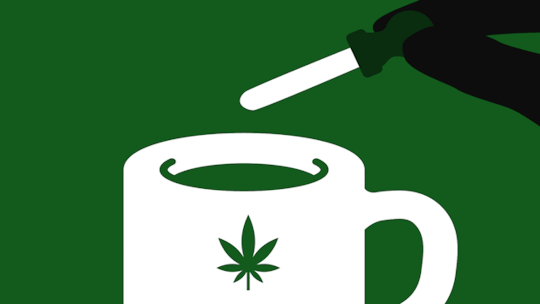







CBD is everywhere. But is it a scam?
The super-popular cannabis compound, explained.
Anyone who tells you anything definitive about what CBD — or THC, for that matter — does to your body is lying
By Dan Nosowitz dd
Part of 1 - The mind, explained
The coffee shop in my Brooklyn neighborhood has a chalkboard outside. It usually reads something like, “Our soup of the day is coffee.” Recently, though, it’s had a marijuana leaf on it, drawn in green chalk.Recreational marijuana is not legal in New York state. What the coffee shop is selling is CBD-infused lattes; CBD, which stands for cannabidiol, is a non-psychoactive compound found in the cannabis plant. Out of curiosity, I bought one. It cost $9 and tasted like a latte with that hint of marijuana herbiness you get from a weed cookie. Google research informed me I would not get high but would be calmer, less anxious, maybe a little sleepy. I have no idea if I felt anything at all. Mostly, I felt like I just spent $9 on coffee.
My coffee shop is not unusual in selling CBD products. In New York, and all over the country, you can find CBD oil in convenience stores, CBD vapes in smoke shops, and CBD tinctures and topical creams in beauty stores. You can buy CBD dog treats in Chicago, a $700 CBD couples massage in Philadelphia, and CBD chocolate chip cookies in Miami. CBD is also being combined with ice cream, savory snacks, and cocktails. Even Coca-Cola is reportedly working on a CBD-infused beverage.
CBD exists at the confluence of three huge consumer trends. The first is the herbal supplement boom, a $49 billion-a-year industry that has seen rapid expansion since about 2010. The second is the rise of the anxiety economy, in which all sorts of products, from fidget spinners to weighted blankets, are pitched as reducers of the mild panic of everyday life. And the third is the near-overnight creation of a legitimate cannabis industry, thanks to the spread of marijuana legalization.
The exact legality of CBD is tricky. The Drug Enforcement Administration maintains that CBD is federally illegal but will not bother going after anyone for possessing or using it. Many argue that a provision in the 2014 farm bill allowing industrial hemp pilot programs, mostly aimed at the textile industry, actually made non-THC use of cannabis legal; while the much-delayed 2018 farm bill signed into law at the end of the year made industrial hemp legal nationwide, CBD has largely yet to be reclassified.
It doesn’t really matter: The result is that anybody, in any state, can seemingly buy CBD online or in a local brick-and-mortar shop without fear of arrest. That availability made CBD at least a $350 million industry last year; some estimates suggest that by 2020, annual sales of CBD products could top $1 billion — and some say it already has.
Despite this, CBD is something nobody knows much about, and certainly nobody is monitoring it properly. CBD is widely marketed as a supplement, despite the Food and Drug Administration saying it does not qualify as such (this is because it is an active ingredient in drugs which are either approved or under investigation to be approved). According to the FDA, the 2018 farm bill “preserved the agency’s current authority to regulate products containing cannabis or cannabis-derived compounds,” though the agency has largely ignored CBD up until now. On the FDA’s FAQ page, a vague answer maintains there are “many factors in deciding whether or not to initiate an enforcement action”; the agency plans to hold a public meeting and generally fact-gather “in the near future.” The Department of Agriculture handles research grants and pilot programs for hemp, but that’s where its involvement ends.
Research and regulation of cannabis in general is decades behind other crops and drugs because of its long prohibition. We’re in the early stages of a chaos period that will last a decade at minimum — a substance has to be legal in order for scientists to figure out how it works and for the government to figure out how to ensure it’s safe. Clinical trials take years to complete and will have to build on each other to create a competent understanding. Coupled with modern technology’s ability to disseminate truths, half-truths, and complete lies, this means we’re in a phase ripe for scams, intentional and not.
Both researchers who work with CBD and professionals who actually grow the raw material — those who best understand this compound and how it interacts with the human body, the people with the most investment in and knowledge about it — are skeptical to the point of scornful about consumer CBD products.
Esther Blessing is a professor and researcher at NYU who performs and reviews clinical trials on CBD’s effectiveness in treating post-traumatic stress, anxiety, substance addiction, and other conditions. Speaking about widely available and unregulated CBD oils, she says, “This is the main scam, snake oil thing going on out there now.”
CBD is about as poorly regulated and understood as a product this popular can possibly be. It’s not accurate to say that CBD, as a whole, is bullshit. From a medical perspective, it’s promising; recreationally, it’s interesting. But that doesn’t mean the stuff you’re buying works.
We know basically nothing about CBD
Anyone who tells you anything definitive about what CBD — or THC, for that matter — does to your body is lying. Nobody knows. The legitimate research out there is extremely limited, and the slow drip of legalization — medical use, then personal use, federally illegal but permitted by certain states and cities — has made it incredibly hard for researchers to do their jobs.
Here’s what we do know: The cannabis plant contains a wide variety of chemical compounds, many of which fall under the broad category of cannabinoids. There are more than 100 — exactly how many, we’re not sure. The best-known and certainly most profitable are tetrahydrocannabinol (THC) and cannabidiol (CBD). Both of these compounds stimulate the same receptor in the brain, called CB1, but have differing effects on the brain. Researchers aren’t totally sure why.
It may have something to do with the fact that THC stimulates that CB1 receptor a lot, in turn triggering the psychoactive effects of marijuana like disturbed sensory perception, impaired motor skills, and anxiety. Conversely, CBD stimulates CB1 very lightly, causing some effects that seem downright opposed to those of THC including relief from anxiety, stress, and hyper-excitability.
Unlike with THC, CBD’s effects aren’t limited to that single receptor. These effects are not precisely known, though CBD certainly has some impact on CB1’s sister receptor (CB2) as well as a receptor called 5-HT1A. When the 5-HT1A receptor comes into contact with a material that agonizes it, the effects can include reduced anxiety and increased calmness.
The limited studies out there indicate that CBD has, in its various interactions with the brain and immune system, some anti-inflammatory and anti-anxiety effects. It can balance out the effects of THC by reducing the anxiety THC sometimes brings, and many in the industry are big on “broad spectrum” or “full spectrum” configurations, which use many cannabinoids at once.
KEEP READING
https://www.vox.com/the-goods/2018/11/1/18024806/cbd-oil-vape-hemp
4 notes
·
View notes
Link
By now, the spectacle that is South Africa’s insurrection has been dominating the attentions of just about every political junkie on twitter, drawing the best minds from every corner of the world to bear witness to the fall of the rainbow nation into a predictable quagmire of irresolvable chaos. At home, the pessimism comes in many flavours, and the denialism in many, many more.
The brute facts are now well-known. After dodging prosecution for extreme corruption for over a decade, the former president Jacob Zuma was finally arrested for the relatively minor charge of contempt of court, for not appearing when summoned. While he held out for several days as his supporters (who comprise about half the ruling party including several senior cabinet ministers) picketed outside his palatial compound (bought with the UK foreign aid budget of 2017) and blocked police from entering, he eventually handed himself in. So concluded a long factional battle between Ramaphosa and Zuma that claimed hundreds of lives in burned freight trucks, assassinated councillors, and billions of Rands in legal fees, patronage and PR. Or so it appeared.
On the 8th of July, the president disbanded the Umkhonto weSizwe Veterans Association, essentially the continuation of the old military wing of the ANC, and fiercely loyal to Jacob Zuma. The next day, together with assistance from elements within state intel and security, they deployed to major transport routes, food depots, retail outlets, police stations, power stations, water treatment plants, and ports, to shut down and burn what they could, crippling the Johannesburg-Durban trade artery that carries 65% of our trade volume and half our economic capacity.
After encouraging looting targeting white-owned businesses or “white monopoly capital”, the MK vets could watch as riots burst out to take advantage of the chaos and everything was stripped to the bone by opportunistic looters. In the shadows, organised and disorganised elements blurred together, as even the wealthiest elements of black society got in on the fun of looting, packing luxury sportscars with groceries and appliances before watching the flames tear down the shops and factories.
The police and the military did nothing, and the president was silent, paralysed. Soon the violence spread to the suburbs, and residents cobbled together militia to guard their homes. Proof of address was required to buy groceries. This received wails of agony from the press class and black social media. Slogans calling for the slaughter of Indians (who form a large minority in Durban) and whites became common, and soon the newspapers were joining in on the scapegoating, accusing the citizens’ militia of racism.
…
Everyone here saw this coming, but for decades now, it has been an unacceptable thing to do, to remark upon the inevitable future we find ourselves in. Why it came to all this, and why it matters to Americans and Europeans, is the point of this essay. It will be uneasy to stomach, but it must be swallowed. We live on the brink of barbarism, and the West is following us every step of the way.
A nation may have a lot of ruin in it, but a poor nation has less ruin in it than a wealthy one. When a state collapses or undergoes revolution in the distant reaches of Africa or Asia, there is a certain social distance which prevents Westerners directly apprehending the significance of the social dynamics, the closeness of the dangers, the universality of the lessons, the pain and the tragedy of the loss.
But South Africa is different. South Africa is at once Western and alien to Westerners. Our constitution is Western. Our revolutionaries and our reactionaries and our racial cosmology is Western. Our highest aspiration is that of the West at large – a universal state which recognises no difference of class, race, or creed. And that is why when we observe South Africa, we stare into the abyss of Western civilisation and its global future. Each Westerner sees himself reflected in that void, from the national-socialist, to the anarcho-communist, to the black-nationalist and the bleeding-heart liberal.
And they are right to.
…
Watching any graph of any indicator in South Africa sees every resource drying up, every indicator of health taking a nosedive, and the population booming beyond control, kept in check only by the enormous and perennial pandemic of AIDS and tuberculosis that take many times the number of victims supposedly taken by the SARS-CoV2 virus, every year. We are the rape capital of the world, have seen over half a million homicides since 1994, and the state has not replaced any of the infrastructure built by the Afrikaner nationalist government. The graphs just spell doom in their trend lines, and have for years now, as the Centre for Risk Analysis’s I-told-you-so’s often repeat.
When they came to power, the ruling party was a coalition of communists, black nationalists, organised criminals and common thugs. However, their patrons in the Soviet Union were disbanded, and the Western state apparatus was still composed of law-abiding institutions and competent civil servants. So they purged the minorities, and placed party members at all key posts throughout, to ensure ideological and partisan loyalty – this was called cadre deployment. This crippled the institutions. When the last of the old guard experts were ushered into the wilderness in 1998, they made several systematic departmental reports, which declared the need for replacing infrastructure immediately, to cope with the increased dependent population. This was ignored, largely because the experts were white.
…
While many see the doom as setting in after 1994, it in fact began much sooner. The means by which the ANC gained power was not through civil disobedience, but through a long and sustained campaign of totalitarian violence called the Peoples War, which raged from 1979 until 1993. Black wage increases increased faster than white until this period (51.3% vs 3.8% since 1970), economic growth was over 5%, inequality was falling and blacks enjoyed the highest standard of living of any black population on the continent.
The addiction to cheap black labour meant that industry was irritated with state policies, and in the end, it was the local plutocrats like Harry Oppenheimer and the old secret societies like the Afrikaner Broederbond who opened secret negotiation to end apartheid. And while SA may have had a robust economy once, nothing survived the People’s War. It aimed to “make the country ungovernable”, and largely succeeded. Controlling migration from the black homelands became impossible, and maintaining law and order as the bodies piled up became harder and harder.
…
But the liberal establishment could not bring themselves to believe there were systemic reasons for this state of affairs beyond “corruption” or “inequality”, and the struggle to blame the status quo on the previous regime became ever harder. So they blamed Zuma. The lost decade, they called it. So when Cyril Ramaphosa, a man largely blamed for the Marikana massacre, finally took the party leadership in 2017, after a long, expensive battle of assassination, bribery and skulduggery, he billed himself as a liberal reformer and anti-corruption campaigner, and the international community fell for it hook line and sinker, and local liberals worshipped him like the coming of a new Mandela. He promised the 4th Industrial Revolution. He promised the reigning in of BEE. The Economist endorsed him over the liberal DA.
But he was lying.
…
There are only three sources for non-socialist print media coverage of politics in South Africa. Politicsweb, where all the old senior analysts go when they become persona non grata, the Institute of Race Relations (a venerable old classic-liberal institute with a daily paper, the Daily Friend, and a consulting business, Centre for Risk Analysis), and Maroela Media, an Afrikaans-language publication run by Afriforum, the civil rights activist organisation which sprung from the Afrikaner-national Solidariteit movement.
Aside from this, every other publication leans further to the left than a man with his left leg blown off, and due to a hangover of apartheid-era Cold War politics, “left and right”, terms only applicable among the educated classes, roughly align with a black-vs-white friend-enemy distinction. The Mail & Guardian, for instance (indirectly owned by the Open Society Foundation), has refused to cover any rural homicide committed against a white victim in nearly a decade, despite a global magnifying glass being placed on the barbaric torture and murder spree that has slowly been smouldering across our rural hinterlands. When a white person commits a crime, it is milked dry every day until the journalists get carpal tunnel. But against the ocean of violent depravity committed by the racial majority, which has taken half a million lives since the fall of apartheid, we receive virtual silence. Swaziland, seeing the same kind of violent uprising as KwaZulu Natal is, is treated as a democratic revolution against a tyrannical absolute monarch, despite the opposition being mainly violent communists receiving support from South African parties like the EFF.
…
I was a communist when I was at university. I was delivered a faithful belief in progressivism, nonracialism, revolution and universal democracy, through the national curriculum in South Africa. I was introduced to Marx and Mill as an A Level student in the UK, and when I returned to my native country, I was exposed once more to the poverty and desperation and racial tensions. I assumed all the positions one would expect. More democracy, more repudiation of Christianity and white people, more redistribution, more socialism. But the political waters were calm in those days, and this was mere posturing. Then in 2015 my friends began a campaign to topple the statue of Cecil Rhodes overlooking Cape Town from the university his will founded.
#RhodesMustFall mushroomed rapidly, and became the romantic darling of not only us horny little revolutionaries, but leftists worldwide, who exported the new iconoclasm to Oxford and South Carolina. It is now remembered as #FeesMustFall, a campaign to make tertiary education free (for blacks). But I watched it grow from the inside, and partook in the occupation of admin buildings, touring other college protests in the Cape out of solidarity. But it became clear that it was first and foremost about racial hatred and the purging of Western influence, under their holy trinity of Steve Biko, Franz Fanon and Kimberlé Crenshaw – segregation, national-socialism and a metaphysical racial hierarchy, in new nation called Azania, synonymous with the basketcase fictional nation of Evelyn Waugh’s novel Black Mischief.
This movement, while it began as nonracialist, soon became openly genocidal. Student leaders who called for genocide went unpunished, even praised by the VC of the University of Cape Town. This movement spread to every single university in the country, and despite prominent student leaders praising Adolf Hitler and calling for whites to be swept into the sea, singing genocidal songs at every protest, white students still offered themselves as human shields before police. Dining halls were segregated, classes were violently shut down, nonparticipants in some universities were beaten in their dormitories, staff were chased with buckwhips, buses were burned, paintings were burned, even security guards were burned, and more recently, so was the continent’s largest library. But no big newspaper offered moral criticism, just worries about whether the tactics were effective.
These young people defined a new era, and a new consensus – all struggles are one, and all are about black vs white, and whites must hand over everything and beg for their lives. The only lecturer in the entire country who stood up in public against this cultural revolution was the antinatalist philosopher David Benatar. All others kept their heads down, dithered, or joined the fray, calling for the heads of their less enthusiastic colleagues. Now the Fallists’ ideology is the official pedagogy of the entire university system. But this agitation had been the nature of political life at the poorer “bush colleges” for years now, just without the presence of minority students to trigger resentment or the ideas to build ideology: shut down every exam season to extract more lenient standards and increases in student grants.
And much like the explosion of violence seen at the national level today, South Africa’s poorer areas have been an unremitting hell for all those living in it below a certain class divide. 15% of all women are prostitutes, and the homicide rate is among the highest in the world, and some areas experience permanent civil war level violence. The old apartheid era town planning meant that black areas and minority areas were clearly separated, and this has meant a geographical buffer, where violent protest, which is again among the highest in the world, has largely left the middle classes out of it, even while it occasionally diverts traffic. Protests flare up constantly, as rival factions of the ANC, hamstrung by a corrupt internal promotions process and forbidden from dragging out dirty laundry in public, instead mobilise violent protests to contest wards and civil service posts, often burning down public infrastructure while the mob on the ground chants for “service delivery”.
…
Whatever else Nick Land writes, the lasting impact he had on me was in the very first essay at the opening of Fanged Noumena. He wrote it in 1989, when nobody beneath the highest reaches and darkest recesses of the Atlantic power structure had any awareness that South Africa was about to change forever.
Apartheid still seemed undefeatable to outsiders. The NP had recently smashed the heart of the ANC’s military campaign, creating a bloody hurting stalemate that observers at the time had no expectation would result in any pleasant outcome. Tens of thousands had already been massacred in the Peoples War to give the ANC a monopoly over the black liberation movements, but they seemed to be running out of steam. And so did Pretoria – influx from the Bantustans was unstaunchable, dependence on black labour was firm, and confidence in local cultural hegemony collapsed in 1976.
Nick Land, watching this, noticed something peculiar.
For the purposes of understanding the complex network of race, gender, and class oppressions that constitute our global modernity it is very rewarding to attend to the evolution of the apartheid policies of the South African regime, since apartheid is directed towards the construction of a microcosm of the neo-colonial order; a recapitulation of the world in miniature. The most basic aspiration of the Boer state is the dissociation of politics from economic relations, so that by means of 'Bantustans' or 'homelands' the black African population can be suspended in a condition of simultaneous political distance and economic proximity vis-a-vis the white metropolis. […] My contention in this paper is that the Third World as a whole is the product of a successful - although piecemeal and largely unconscious - 'Bantustan' policy on the part of the global Kapital metropolis.
…
When the British seized the Boer republics in 1900, they drew up the limits of control of the native African tribes where they already lived, and displaced a few thousand of them to tidy up the borders. These eventually became the Bantustans. Immediately, a long slow trickle of immigration was encouraged, not just from the Bantustans, but from British possessions in Asia. The migrant labour created a dense network of diffident ethnicities who demanded fences between them and their neighbours, while attempting to pursue economic exchange.
Black men, who could achieve far greater material wealth from working in the white economy than raising cattle and sorghum in the homelands, flowed steadily into white farmland areas and mining towns. In 1922, the South African Communist Party launched a general strike to demand the enforcement of a colour bar – “CPSA for a white South Africa!”. They were put down in a hail of gunfire by Jan Smuts, the architect of the unitary constitution, which allowed no devolved powers for regional self-governance.
Smuts was a member of Cecil Rhodes’s Round Table club, and shared Rhodes’s ambition to create a grand state where all literate English-speaking men and women south of the Zambezi would have the vote regardless of colour, and all the resources would belong to one grand cartel controlled by a British-American elite of enlightened natural aristocrats. Rhodes used money from his diamond empire and loans from Nathan Rothschild to fund the Jameson Raid and other means to instigate war with the Boer republics, which eventually resulted in the second Boer War and the creation of the Union of South Africa.
…
Smuts, architect of the Union of South Africa, also had a grand philosophy not unlike Nick Land’s – Land treats all matter and life as being ontologically the same, driven by “machinic desires” – all tendencies to motion and behaviour, whether in living or non-living material being fundamentally the same. All matter seeks more complex and integrated forms over time as a result of the force of entropy. Smuts’s grand philosophy, of which he wrote at length in Holism and Evolution, envisaged a means of looking at the world in which all of nature and society could be apprehended and governed as a single holistic system – all organisms, all cultures, all individuals, were destined to evolve into a greater whole, in which each part had its natural place, and that the common teleology of all matter and spirit was the global state, embodied in the League of Nations, the constitution of which he penned himself. Together with his extensive biological knowledge, Smuts and his London interlocutor Arthur Tansley gave birth to the modern systems theory of ecology, and hoped to see a central global technocracy overseeing a holistic ecological management system.
The aims of the United States since the Second World War have some remarkable similarities in approach. The post-war order saw the US employing a philosophy of “defence in depth,” controlling a defensive frontier from the China Sea in the East to the very edge of the Warsaw Pact countries, to ensure freedom of trade throughout this entire region. But this extended beyond military control. The use of embedded CIA operatives meant that those democratic representatives who resisted the grand plans of Atlanticism were swiftly dealt with under insidious operations like Gladio.
…
As these ideas bled into the old left, who were increasingly disillusioned from the failures of the Soviet Union. They turned, as Laclou and Mouffe did, to the notion of using sectional grievances to deconstruct the nation state, leading to the birth of intersectionalism under Kimberlé Crenshaw. The very foundations of nationhood and capitalist Christian civilisation could be toppled if only we united our struggles by leveraging our historical grievances, creating acrimonious divisions in the body politic on the basis of sex, sexuality, race and religion. Thus, the universal loyalties of the nation state that supposedly upheld capitalism would fall, and revolution would arise. This fell right into the plans of the American ruling class.
However, when the social morality of the postwar American colonial project in Europe met the plans of the military and the Malthusian tendencies of the RAND corporation, everything took on a far more ambitious character, with the help of a concept called “environmental security”. The first reference to ES in the sense of protecting the natural environment comes from the US EPA Technical Committee in 1971, as part of an ambitious attempt to quantitatively measure total social wellbeing. This EPA committee was the first to make environmental regulation part of a comprehensive plan for social wellbeing, driven by Holism and cybernetic ecology. They were exceeded in scope by the UN’s 1972 Stockholm Conference, where the idea of “comprehensive” (today, “human”) security emerged, and further, the Palme, Brundtland and Brandt Reports.
…
Under these new umbrella concepts came “human security” and environmental security, the Social Sciences Department of UNESCO and the SSRC found the unifying principles and programs they had sought since the 1950s, and pushed a proselytising program grounded in cross-discipline application of avant-garde ideas to seek “new ways of knowing”, promoting not scientific objectivity, but a synthesis of diverse perspectives. A wholesale transformation of the rules and discipline of social sciences followed, in service of global governance (see the works of Perrin Selcer).
UNESCO even deliberately set about creating a new world religion, in the words of its founder Julian Huxley, and formed the United Religions Initiative, to mould the world’s spiritual beliefs in line with international Anglo progressivism. Feminism and sexual libertinism formed a crowbar against the community cohesion that couldn’t be attacked by means of anti-nationalism, and into this soup of value inversions (erosion of disciplinary distinction, inter-subjectivity [i.e., truth-by-consensus over objectivity], and utopian welfare ideals like “freedom from fear”; “freedom from want”), dropped three wonder pills: Poststructuralism, the collapse of the Soviet Union, and Global Warming. Now the great power-narratives of the Atlantic empire were consolidated – Malthus-by-proxy, anti-traditionalism, international diversity-and-inclusion, and the free-trade, open-borders paradigm of the 90’s.
In the same moment as de Klerk gave up on apartheid, the West gave up on the nation state, and handed control to the internationalists, under hegemony of the Atlantic community. A new empire was being consolidated from the territories captured by the Allies in WWII. Thirty years later it is becoming transparent – the new centralised global tax regime has cemented it. Just as the ANC funds the influx of black voters into urban minority areas to build shacks on squatted land, the West welcomes mass migration from the third world, total open-borders, to transform the electoral system against the interests of the native population who might have their own desires, against the grain of global empire. Every corporation and state in the Western world discriminated against whites in hiring. The CIA peddles Critical Race Theory and actively recruits sexual minorities. Colour revolutions can be spotted whenever the rainbow flag or black fist makes an appearance.
Today, the Democratic Party in the US openly looks to South Africa for inspiration in dealing with what Yarvin called the “outer party” – all conservatives are being purged from every institution, in a vast cadre deployment program to ensure the core of the establishment becomes forever untouchable. On the streets they have even begun to use the same tactics for control – deploying huge mobs to destabilise cities when election season is approaching.
Minimum wage rises funnel employment into companies in public-private partnerships with the state, like Amazon, who is part of the Enduring Security Framework partnership of the CIA (which includes Facebook and Google). The analogies between their experimental management strategies and collectivised central-planning are no accident – any company that aims for a total retail monopoly through state-subsidised negative-profit growth is merely another route to total control.
And as the nation and the state are decoupled, the liberal-democratic institutions are being geared toward the concentration of power and wealth, and a strategy of divide-and-rule, to create a cannibal economy. Only a few, like Denmark, have realised what they have gotten themselves into.
…
Much as Aristotle said, a democracy can only function beneficially when steered by the middle class, as it was in Rhodesia and the old Cape, which restricted the vote to property-owners of all races. The middle class’s needs are the core of the productive community, and as Marx observed, they are loyal to the requirements of productive industry and local trade. With the combination of the proliferation of the welfare state and globalisation, the middle class has been whittled away in the West, just as it has here in southern Africa.
Reliance on the state for services means they can’t be sacrificed – in the UK, the NHS has become essentially a religious cult, feeding the civil service, medical contractors, immigrants and the poor alike, in a financially unsustainable way, for decreasing returns. As Philip Bagus observed, the democratic pressures to maintain institutional support via this sort of patronage forces modern western states to take on ever more debt and expand taxation to the limits. This then must be offset by QE, which must be guaranteed by the central state at a rate that benefits the most fragile provinces of any empire so that the whole system does not collapse.
…
What Robert Mugabe did was pursue the universal extension of a first-world welfare state to every peasant in the hinterland, praised by the global left. This required taking on an enormous amount of national debt. Once the IMF tried to impose austerity, Mugabe found this politically unsustainable – his support depended on the handouts, corrupt and legitimate, that he was delivering. So he had to switch to printing money to pay the debts. When inflation became too much to handle, they replaced the core of the economy with dollars, and only elites could survive, much like Venezuela today. As the national treasury ran dry, the military and the civil service became restless. To placate them, they were fed the farms and businesses of the remaining white minority, as well as many areas formerly occupied by black peasants. The state had to cannibalise itself to sustain the predatory ruling class.
During this time, Mugabe attempted to control every aspect of the environment and economy through price and capital controls, suffocating every aspect of social life with red tape. It only accelerated the process. While the vast global network of UN subsidiaries extract compliance from the US client states
In South Africa today, the state coffers are empty. Even the ruling party is feeling it, as their headquarters Luthuli House was attached by the court to pay for a crooked PR contract they refused to deliver on. We have since taken out an IMF bailout, which is being poured into infrastructure, mostly Durban’s port, which is now choked by smoke and looting. Our president’s advisors are pushing for land reform, and remarkably, one of them, Ruth Hall, was advising Robert Mugabe how to liquidate his pale kulaks back in 2002. Other advisors, like Thembeka Ngcukaitobi, call for the fulfilment of the genocidal prophecy of Makhanda, and have whites deprived of all land and all moveable and liquid assets. This is deliberate Zimbabwefication.
The same economic dynamics are present in the world at large – the share of GDP spent on welfare keep increasing, as does the debt-GDP ratio. Capital formation has been falling for decades, and chronic inflation is treated as a static phenomenon, which nobody dares reign in, because the entire system is dependent on low interest rates to keep the constant corrosive consolidation of the global market going full steam ahead. This arrangement results in the inflation of property prices as along term hedge against inflation which, when the plebs followed suit resulted in the 2008 bubble, when they tried to play the elites’ asset accumulation game with borrowed money.
…
What has America been doing these past 18 months? It has been printing money so fast that it has kept pace with the plummenting Rand, and allowed Cyril Ramaphosa to tell investors that his economy is relatively strong – the Rand has “stabilised”. Error of parallax. Nor is it even just America printing money. While they certainly can afford to, as the holders of the world’s reserve currency, China is attempting to do the same, only they are directly funnelling the cash into commodities, rather than spreading it around a financial elite over which they have minimal control.
And yet their leverage is far worse than America’s – Kyle Bass, who has been shorting the Chinese market for years now, insists that the historically unprecedented levels of leverage in the Chinese economy are unsustainable, and that they cannot, even under miracle conditions, correct their shrinking population trends sufficiently to turn this ship around. But what many forsee in dreams of revolution and revolt, the breakups of massive crumbling empires, is not going to happen as they hope.
Instead, the state will protect the stability of the ruling class and its control over the levers of power at the core, bleeding everyone dry and terrorising them into submission. What happened to Zimbabwe is a warning, but it only happened the way it did because half the population could leave and send home remittances. The iron fist of a “democratic” government capable of rigging its elections and gagging the press and the courts is only as tyrannical as the cost of a bus ticket to the next country. After 900-member Zoom calls and election “fortification”, I shouldn’t need to gild the lily any more.
As many observers of China remark, an economic collapse of a country of its nature will not result in a breakup or a massive reform, but in the shrink-wrap tyranny of North Korea, an eternal sclerotic stagnation, fed by government dependency, held in place by state security. The West is losing control of its ability to provide the kind of total state security required for this however, and has been reaching for a far more sinister method of control – the financial system.
And this is where all analogies break down, because what is about to happen here is unprecedented. The international Bank of Settlements has recently announced that they intend to use Central Bank Digital Currency to control the spending of all global citizens, and have the tech and the power to control each and every expenditure, and to shut anybody out of the ability to feed themselves if they so choose. But this movement to kick away the ladder and consolidate total control follows the same logic as Zimbabwe’s – the poor can only be fed for so long, but the ruling elite must be fed forever, or else the whole house comes down.
…
The twin systems of China and Atlantis are both attempting to consolidate total control over their economic and social environment. And in order to achieve the kind of reforms that he wishes to, Ramaphosa has reached for the help of both power blocs. China has colonised our northernmost province, and receives special treatment from law enforcement that must learn Mandarin. Chinese are registered as black, to benefit from the racial privileges blacks enjoy under Black Economic Empowerment. While the government’s reports usually look like a dog’s breakfast, their reports on the UN sustainable development goals are always crisp, professional, and detailed. SDG 10 justifies the expropriation of property, according to their logic.
…
The erosion of the middle class, the working class, the institutions of law and order and even the substance of the informal economy was dry tinder to the Zuma-faction’s firebrands. To fulfil his mandate to end corruption, Ramaphosa had begun prosecutions proceedings into the Zuma faction – tentatively of course, since any too-wide-ranging investigation would unearth the corruption of all. But lawfare isn’t enough. They were cut out of party patronage systems as big figures like Ace Magashule were expelled from the party. Judges ruled that the state would not cover their defence costs anymore.
When the Umkhonto we Sizwe veterans association was disbanded and cut off from “pension” money, they finally put into action something that they would have had up their sleeve for months. Police armaments caches had been going missing for months. Firearms training for youths had been going on at the local branches for years. Every storage depot and major highway was targeted, petrol stations, power stations, water treatment plants were hit. They needed to make the country ungovernable, and they did. But this time they didn’t have the support of the Swedish, the Russians or anybody else.
Complicit elements are even inside the SSA, our central intelligence agency. What it will take for Ramaphosa to clear the state and party of seditious elements will give him the power of a modern dictator, cheered on my the press and everybody else, who despises Zuma and his people for what they’ve wreaked upon us. But with three months left of military deployment, all of the military capacity in one province, and the president fearing wielding lethal force on black mobs for fear of his Marikana ghosts coming back to haunt him, the rebels have three months to decide whether to act.
That leaves three months to see whether we become a black-nationalist disctatorship, or a new Yugoslavia. The Zulu, who form the backbone of the rebellion, have cheered for Zulu independence before, though their forces are split – the Zulu nationalist/traditionalist party the IFP have stood firmly against this chaos. Zuma’s people are still pushing black identity over tribal. Zuma may have been a traditionalist, a defender of the Swazi royal house when in crisis, an expander of chieftains’ rights, but his time in head of the ANC death squads in Zululand in the 1990s makes Zulu solidarity impossible.
So chaos it is.
2 notes
·
View notes